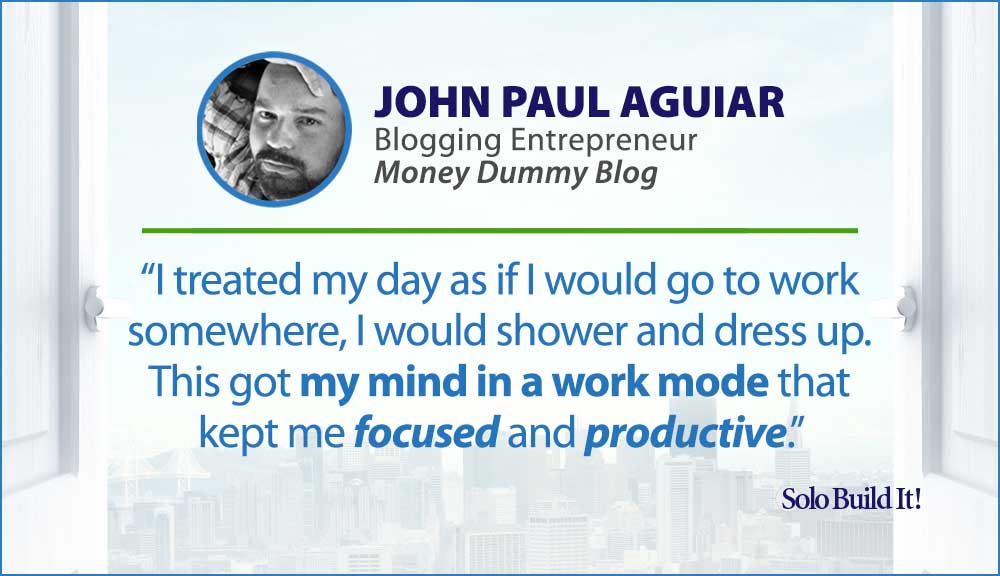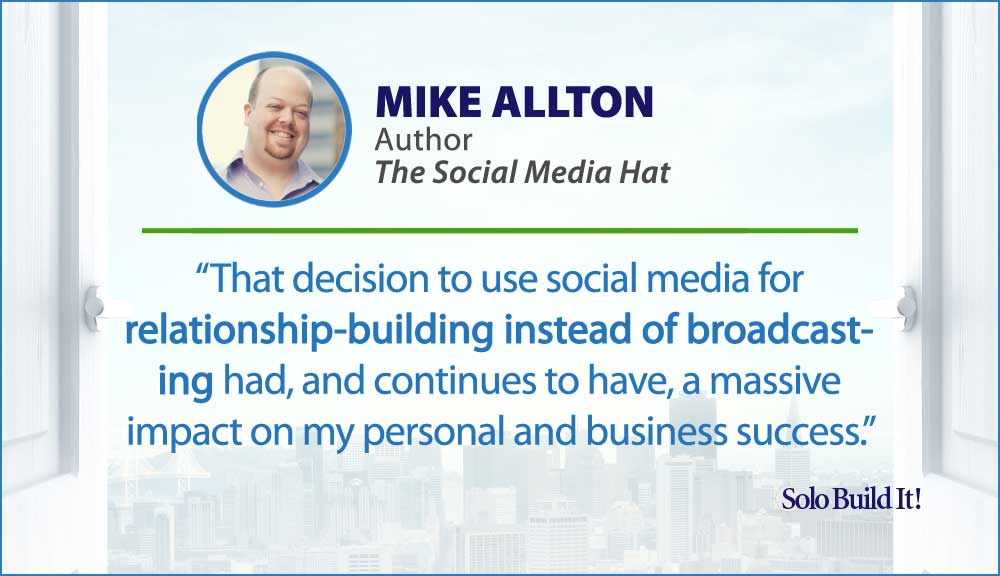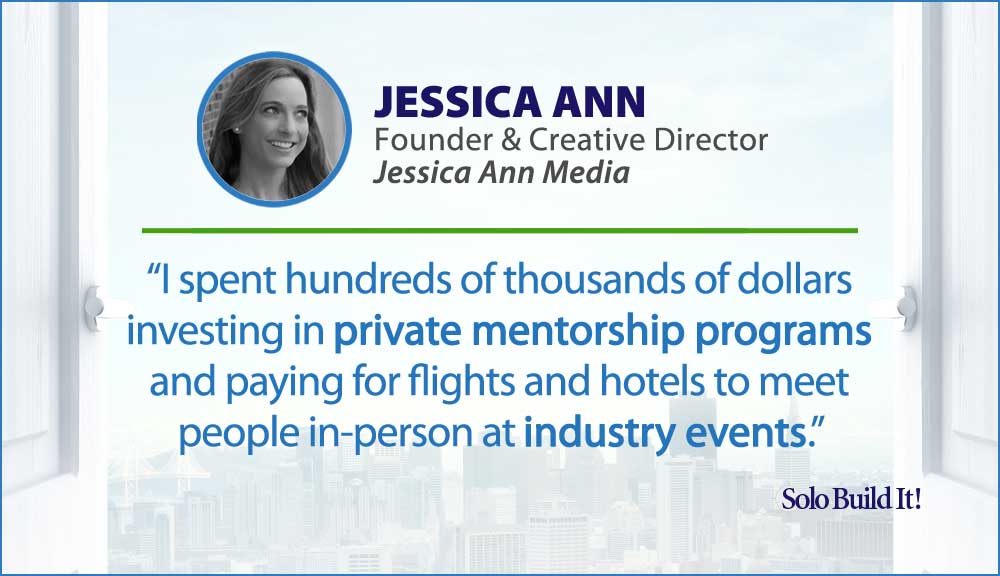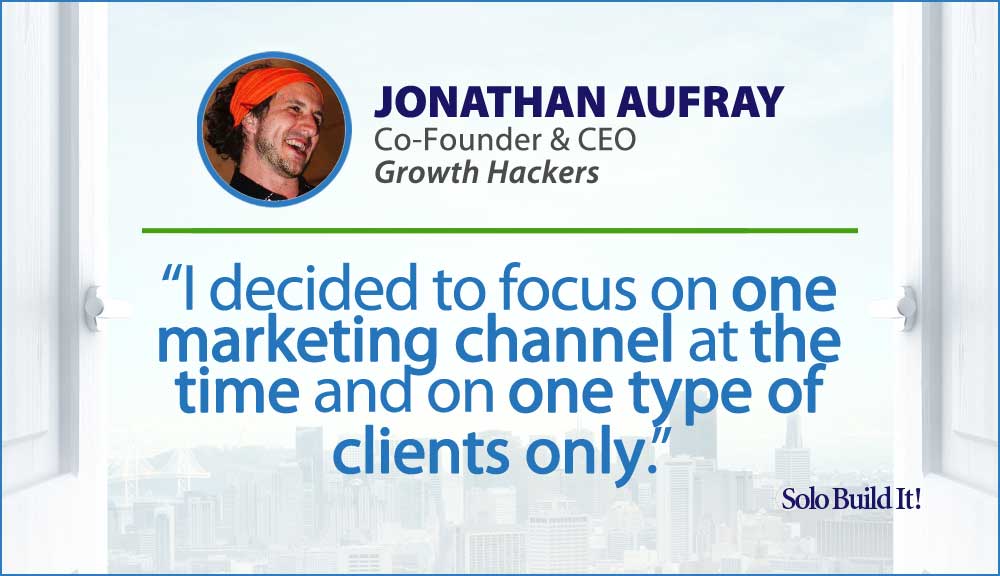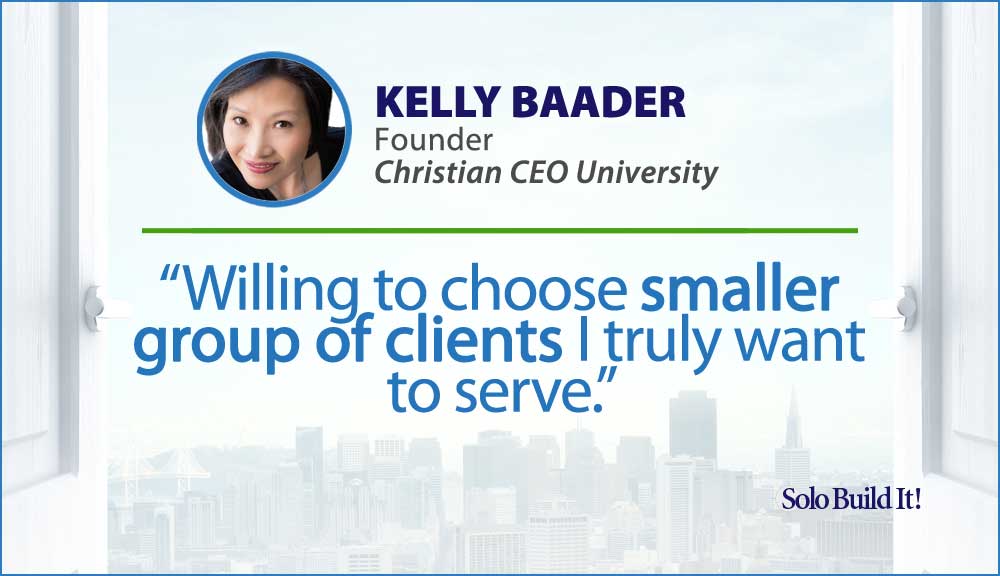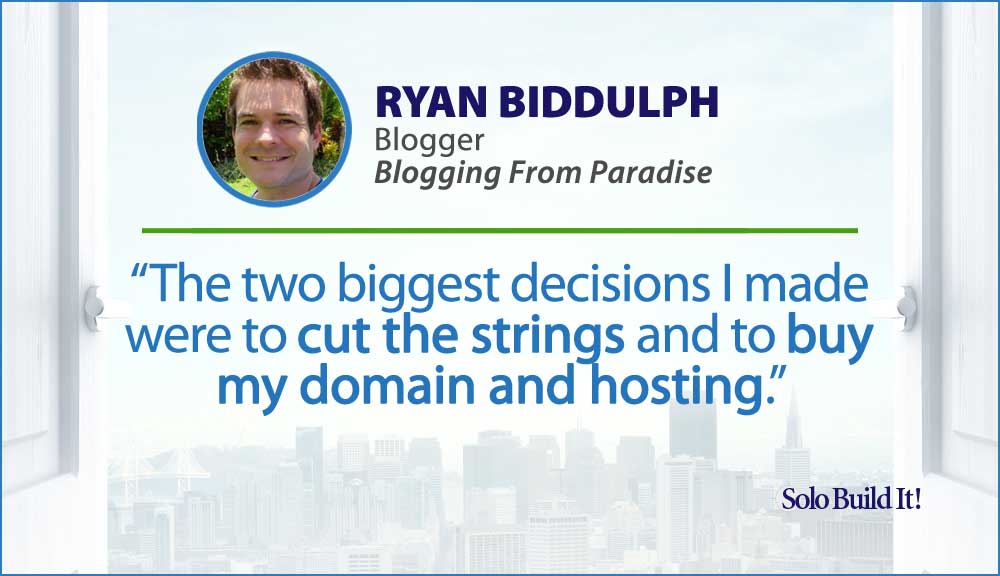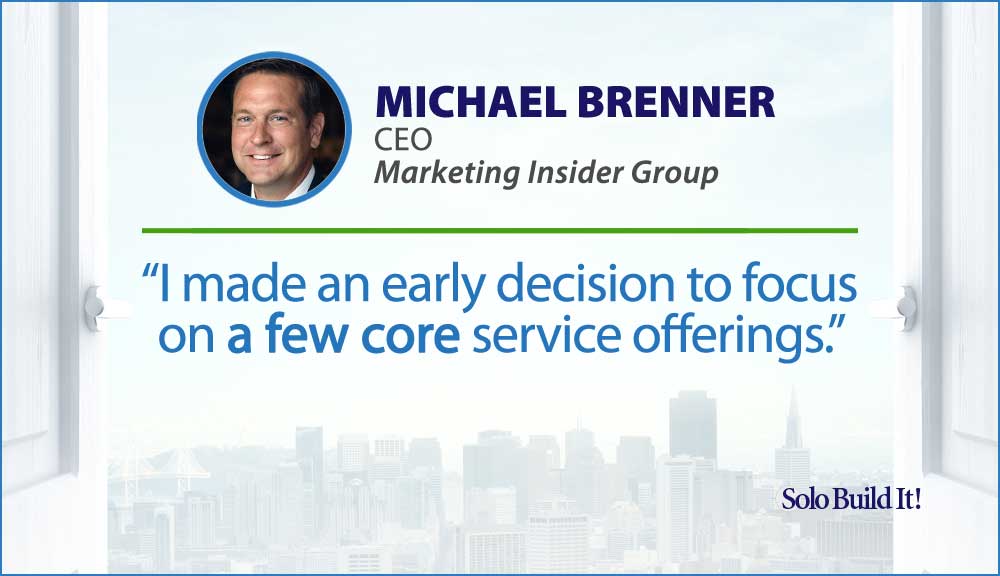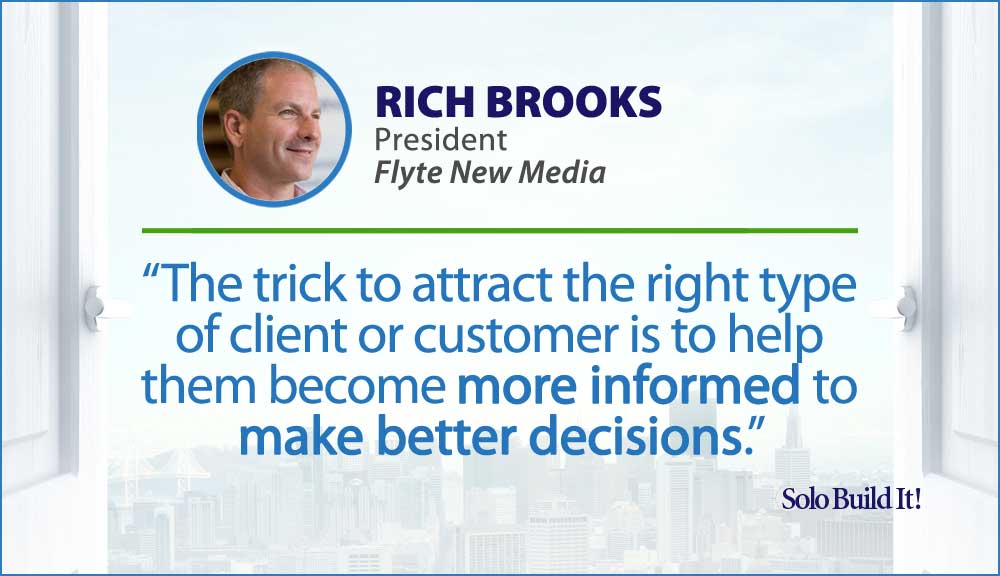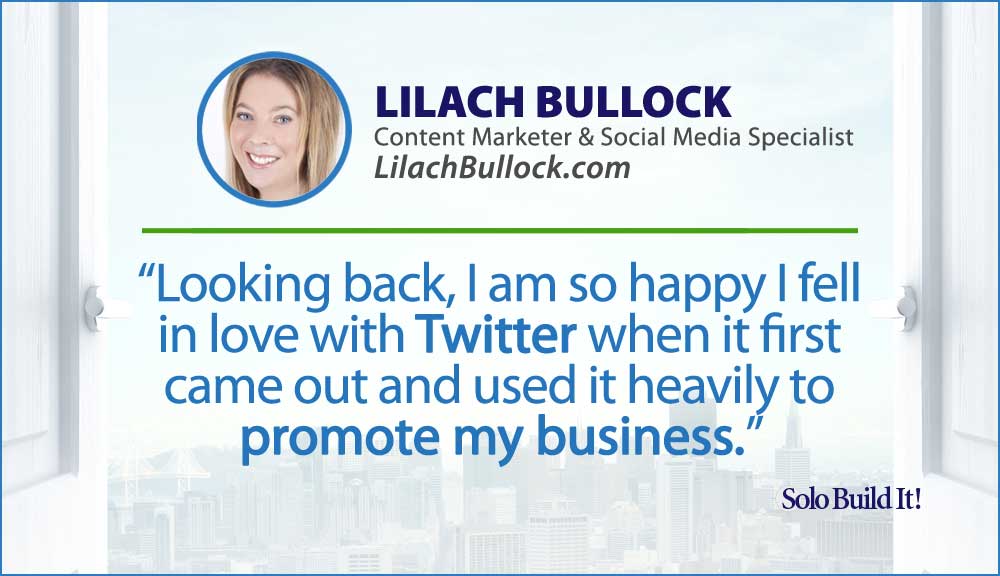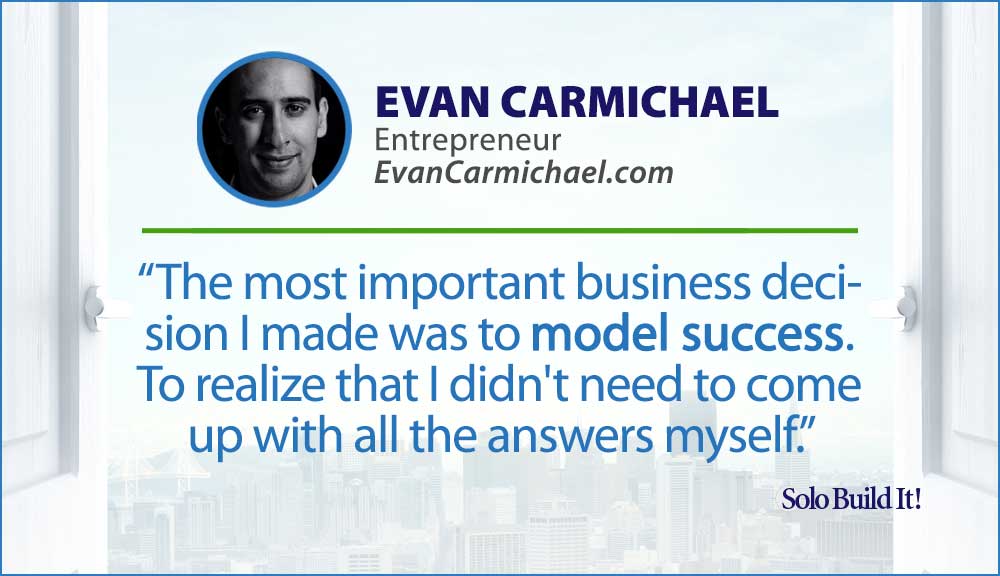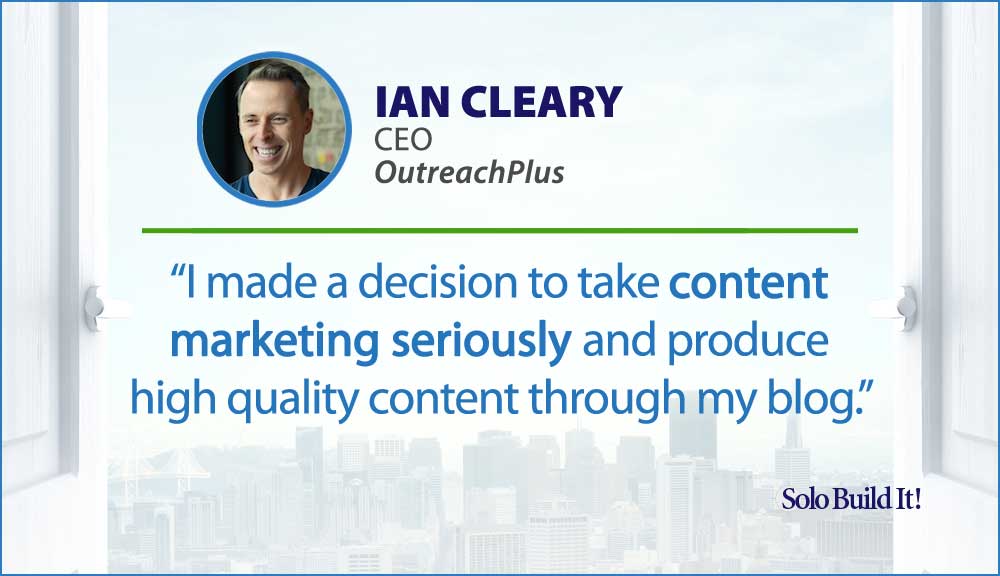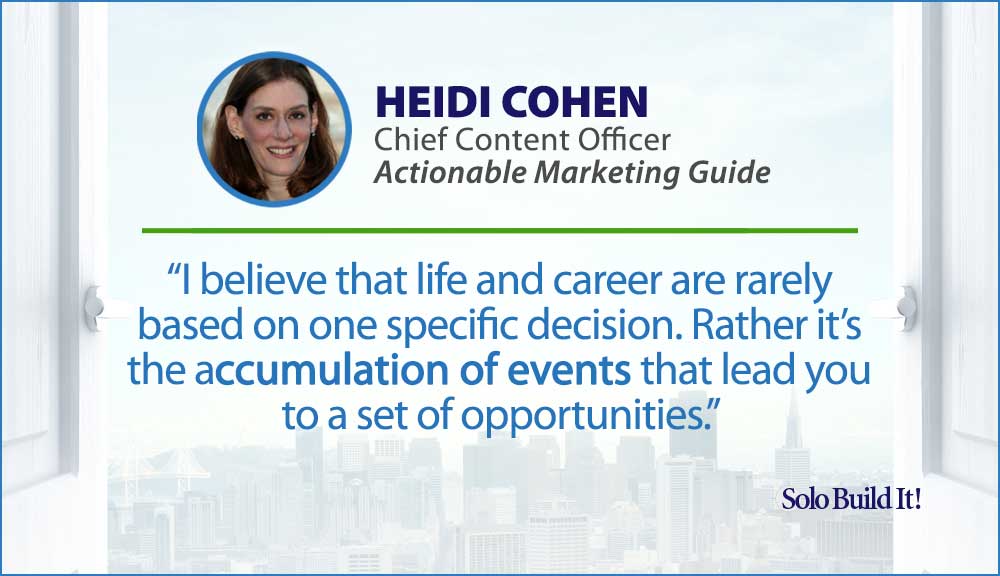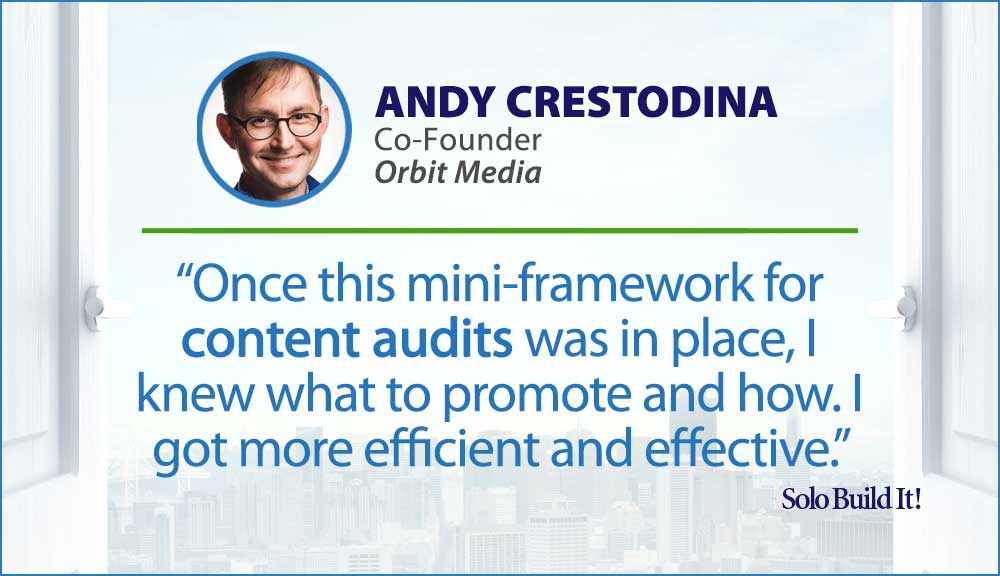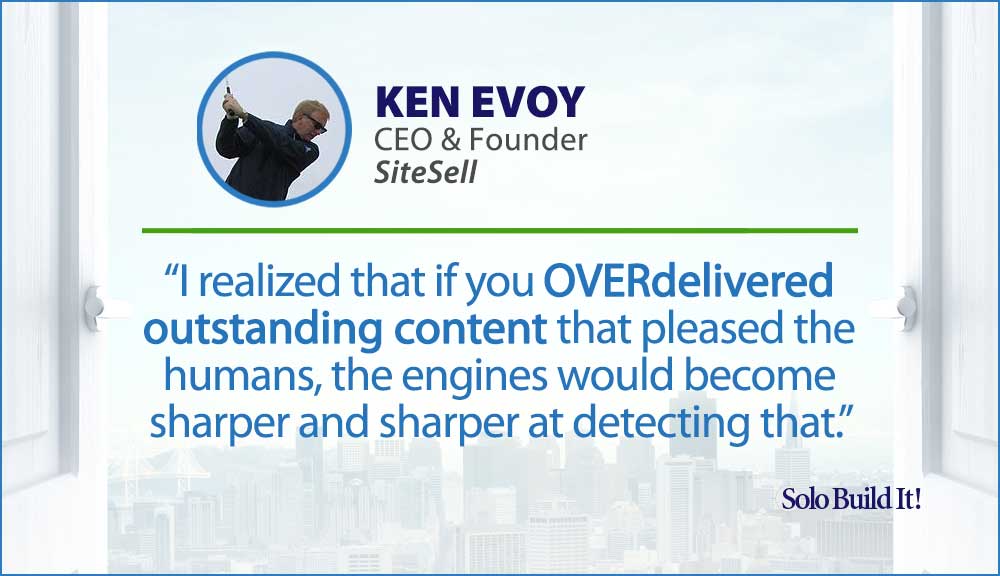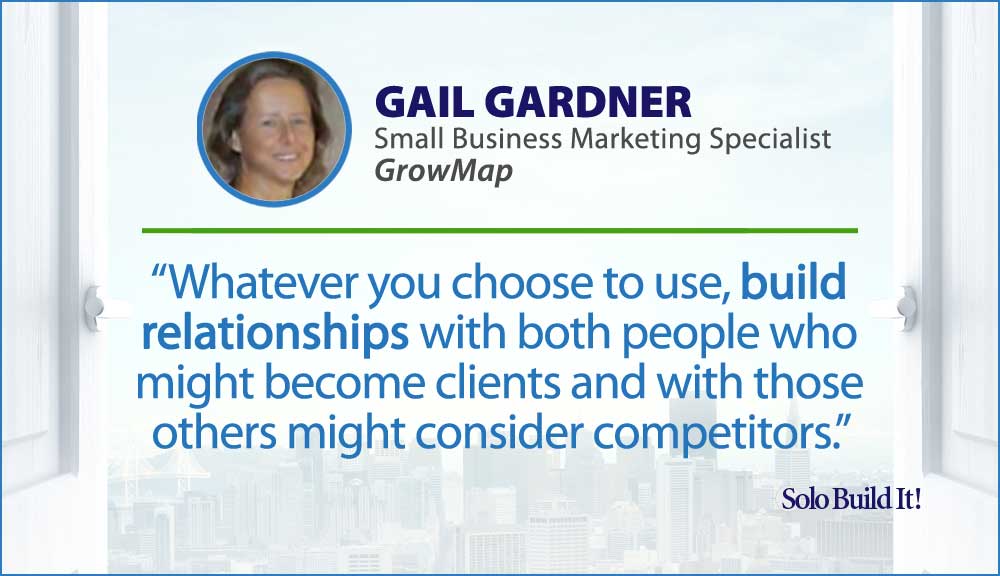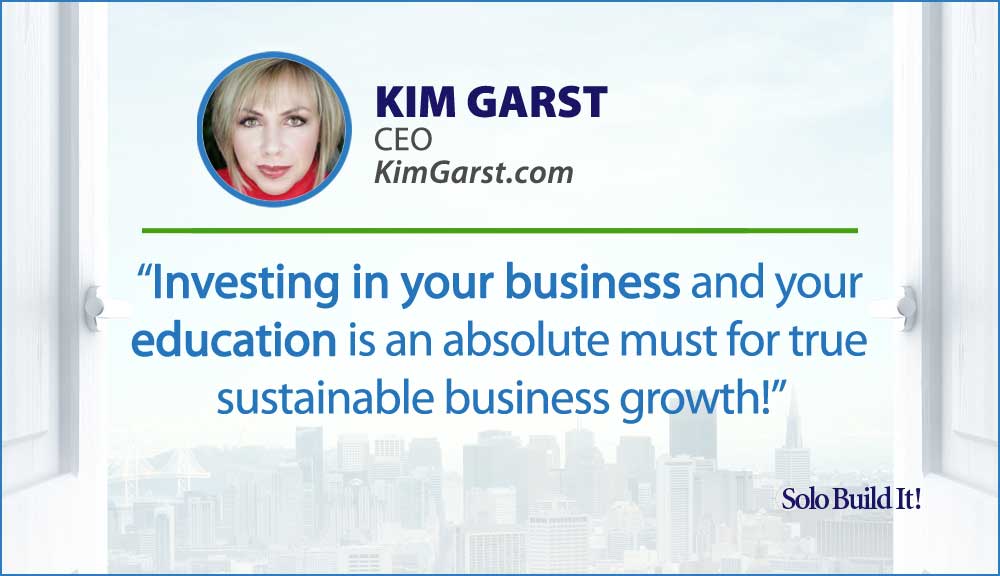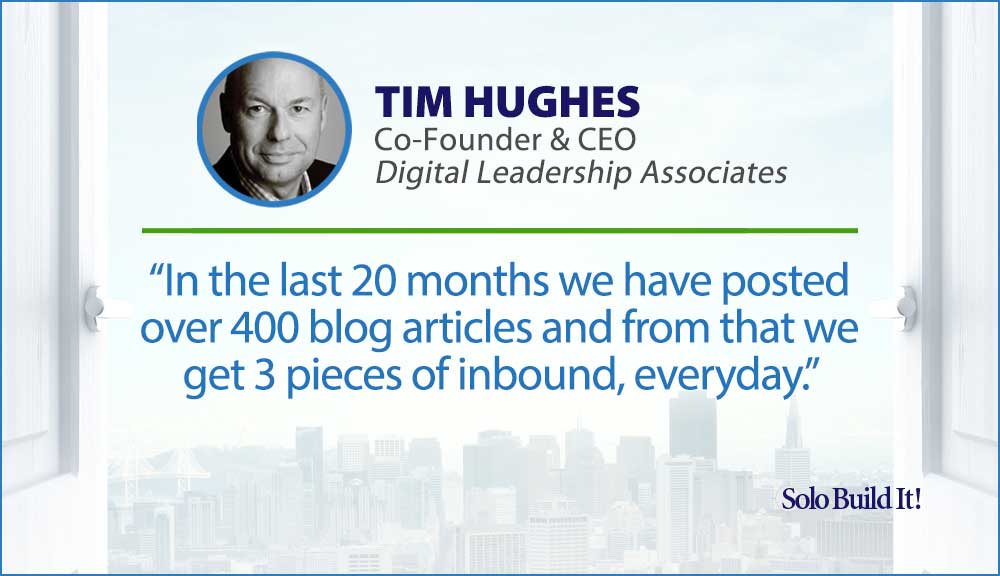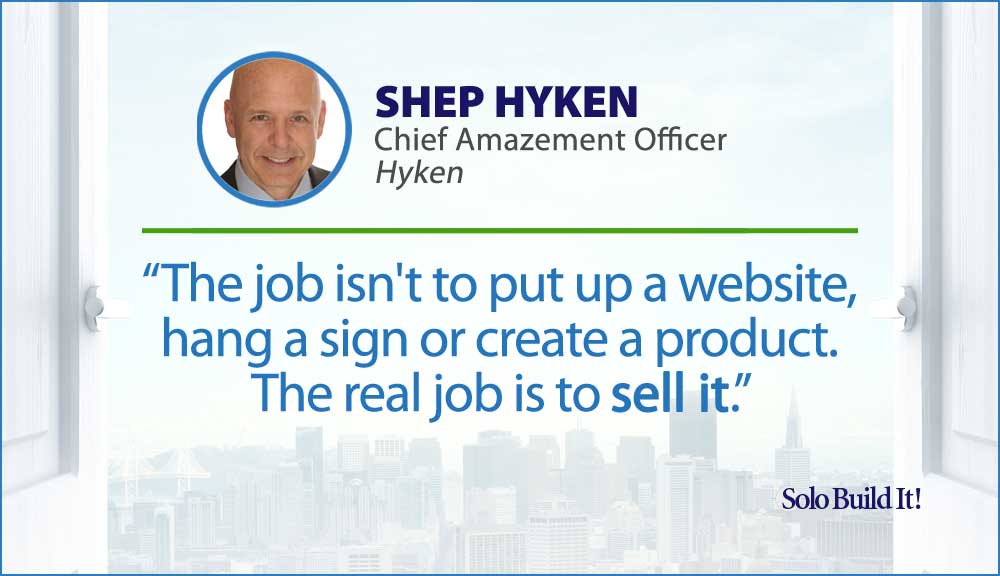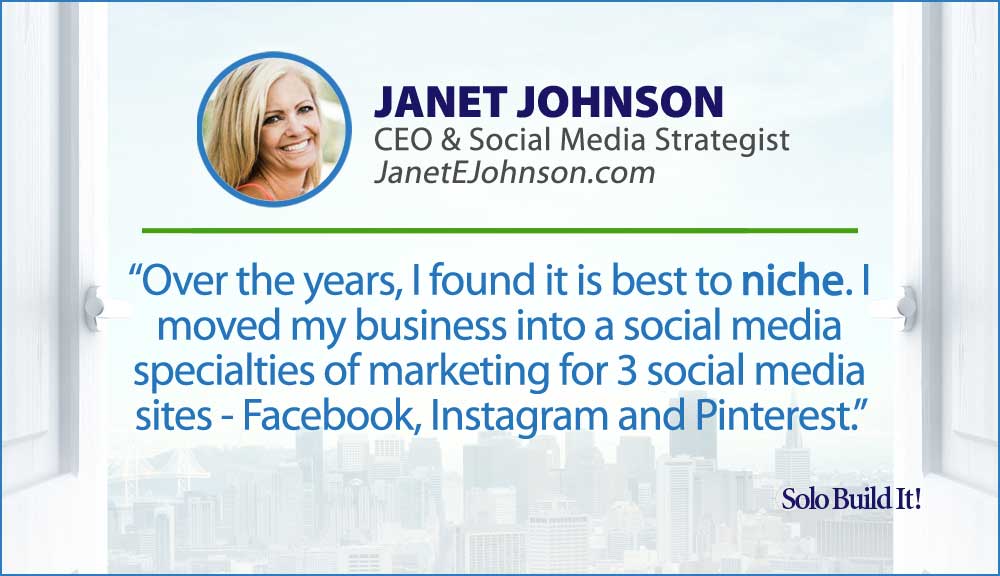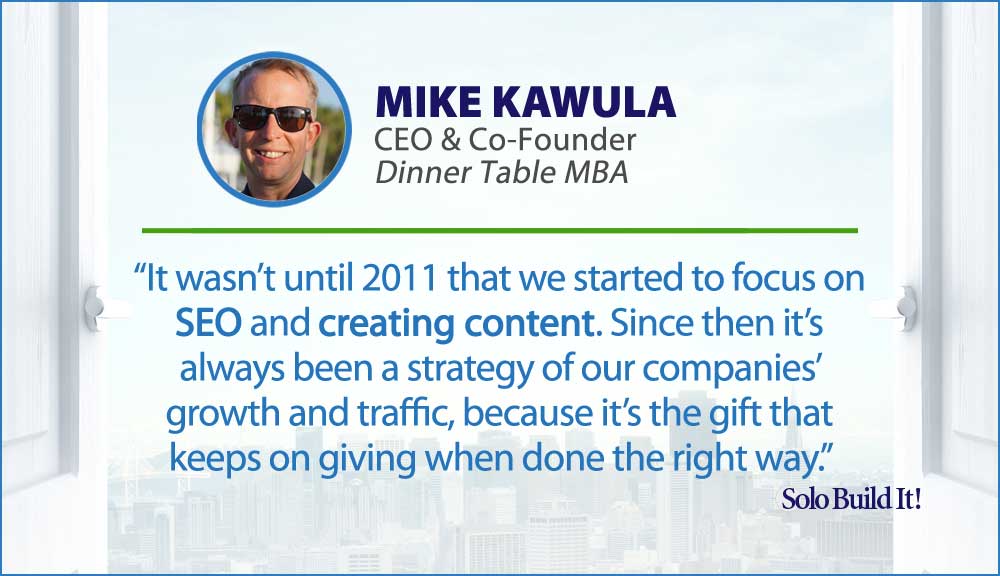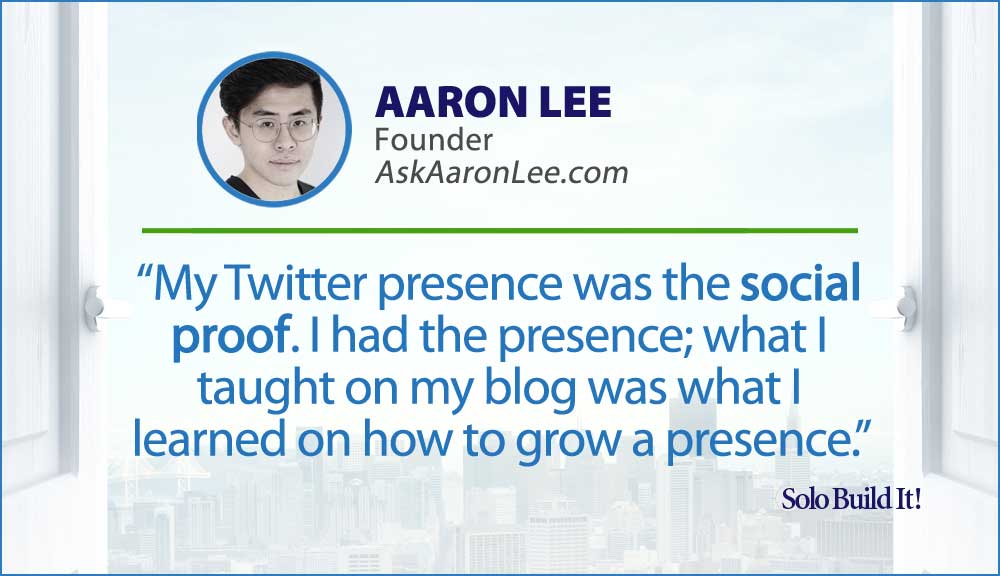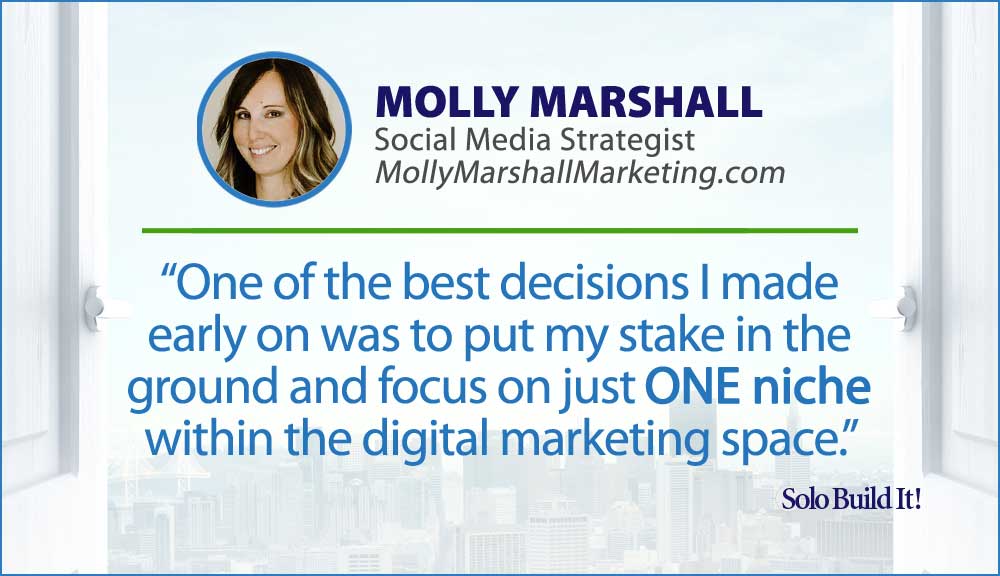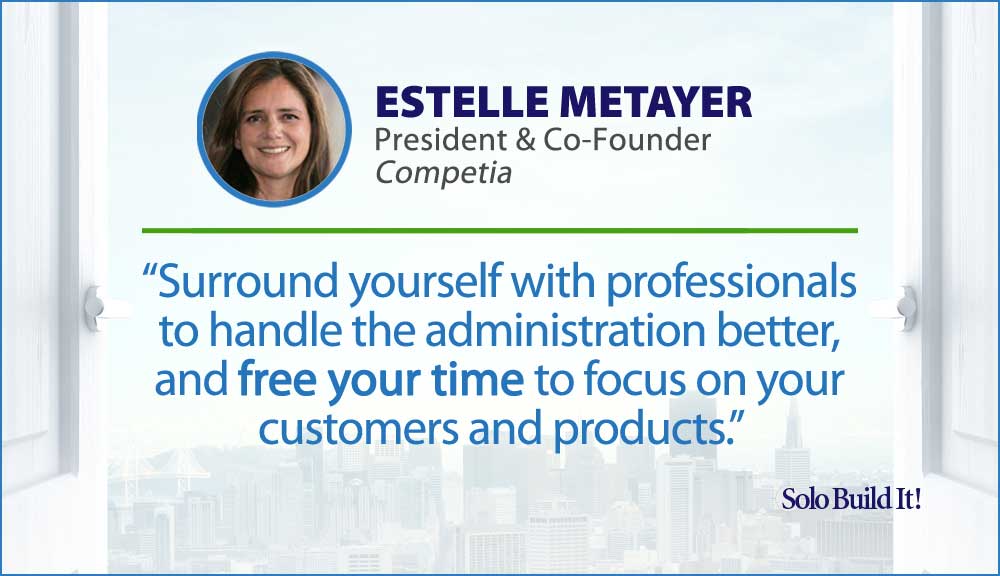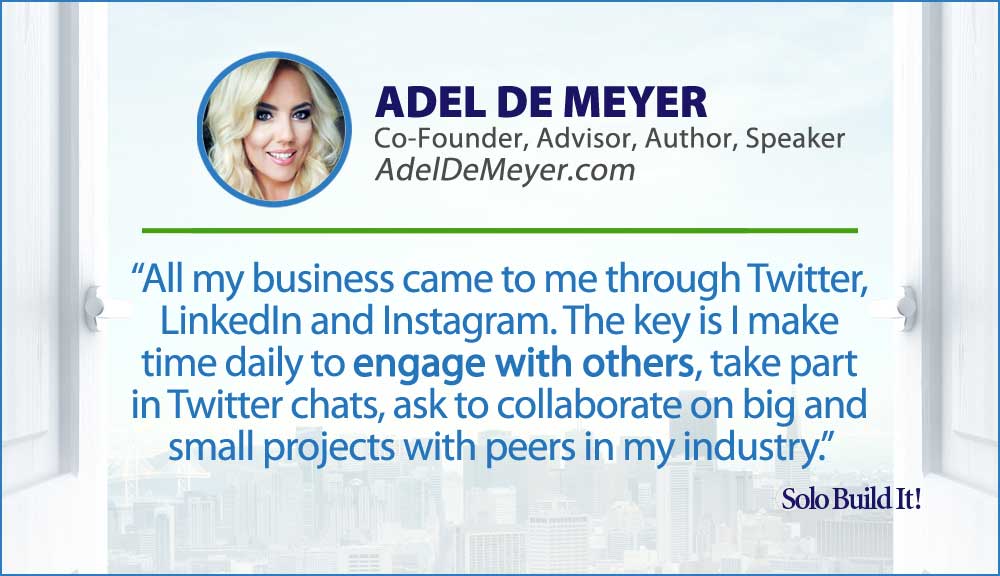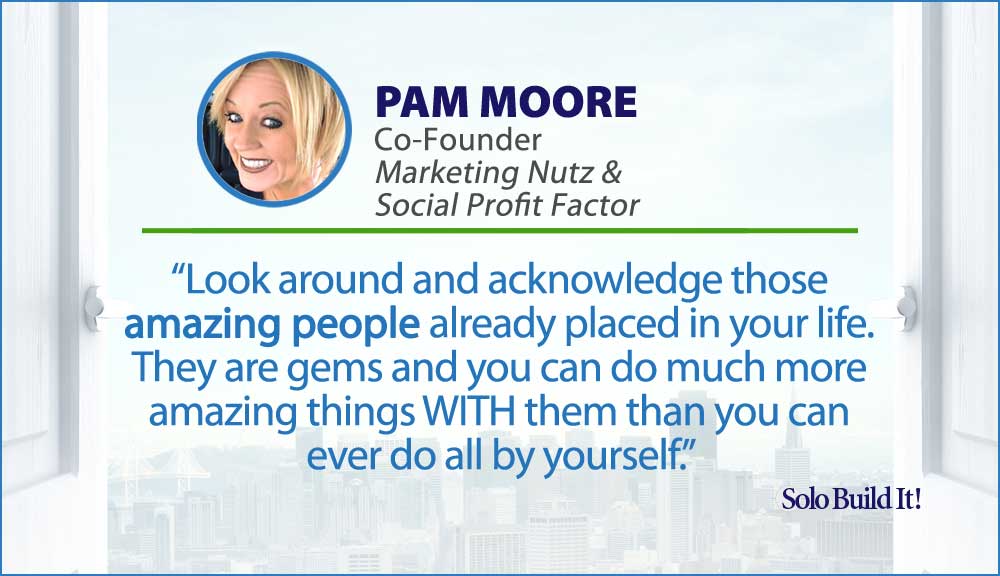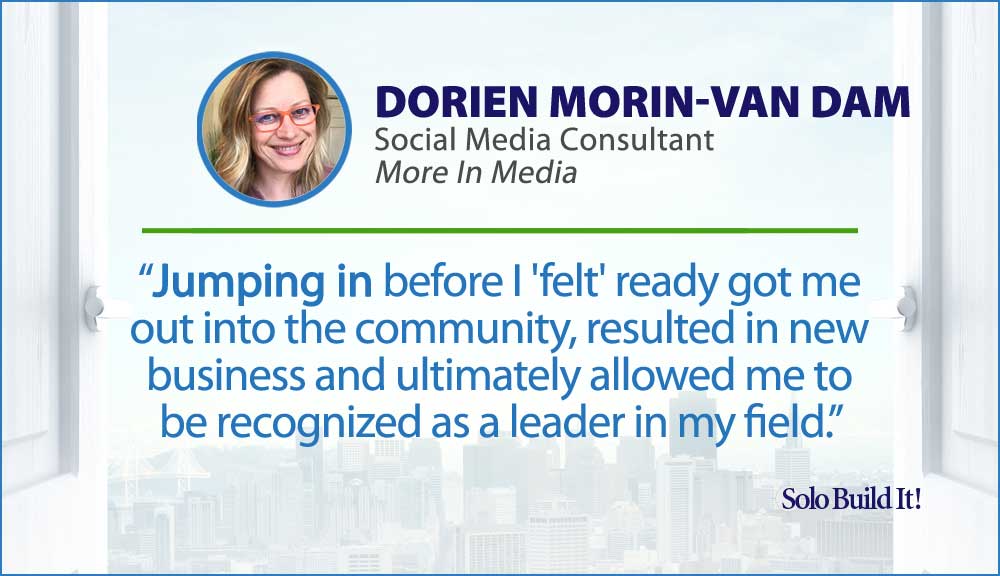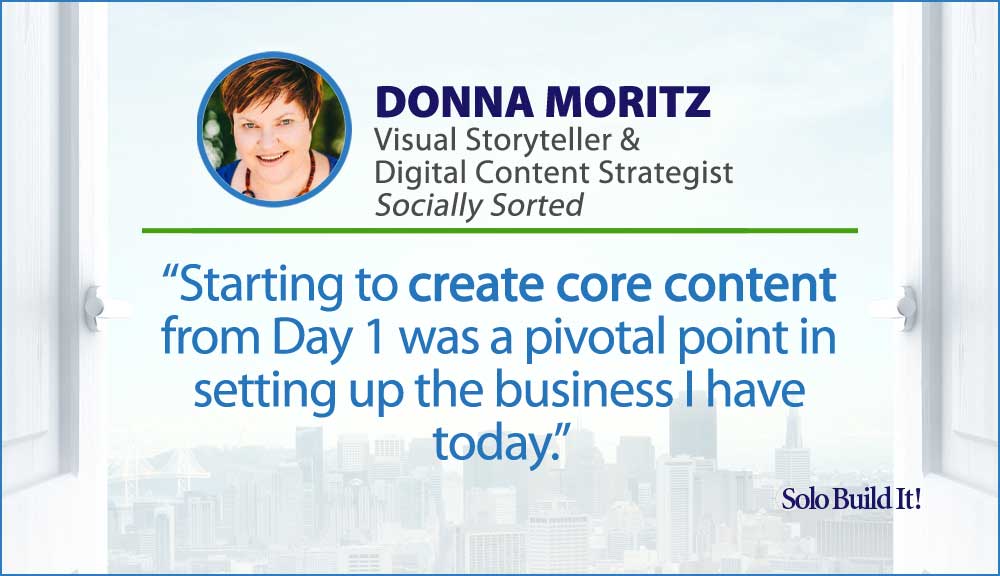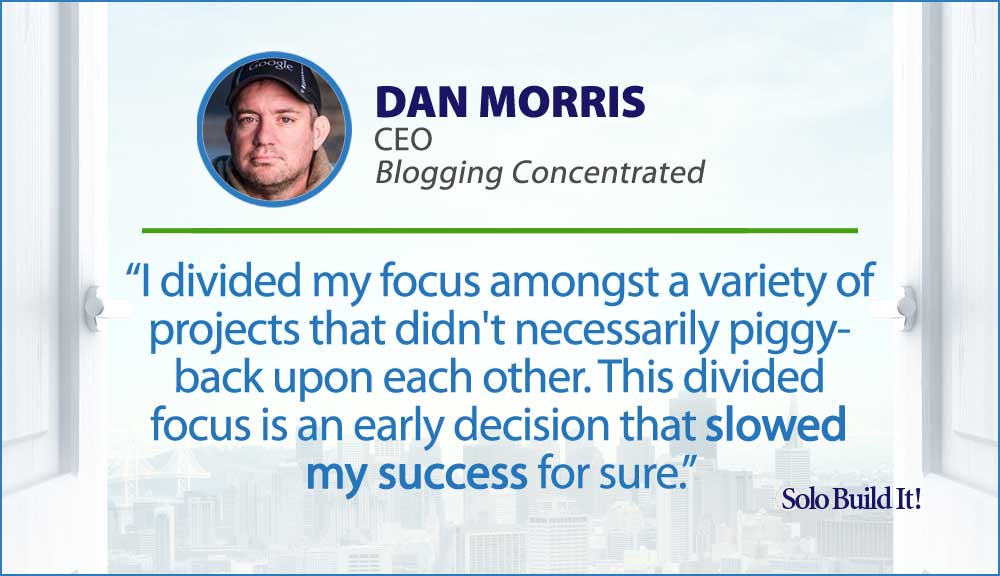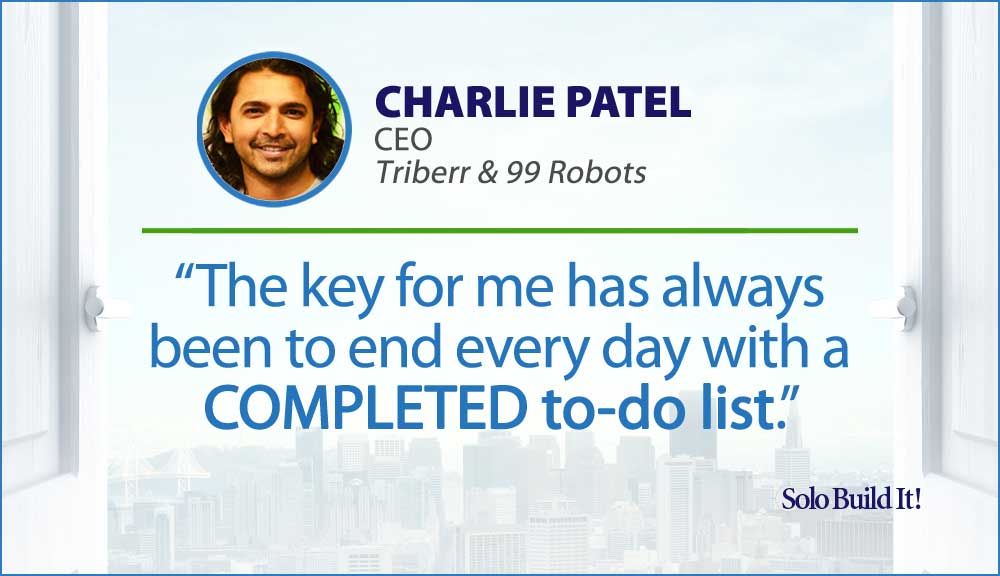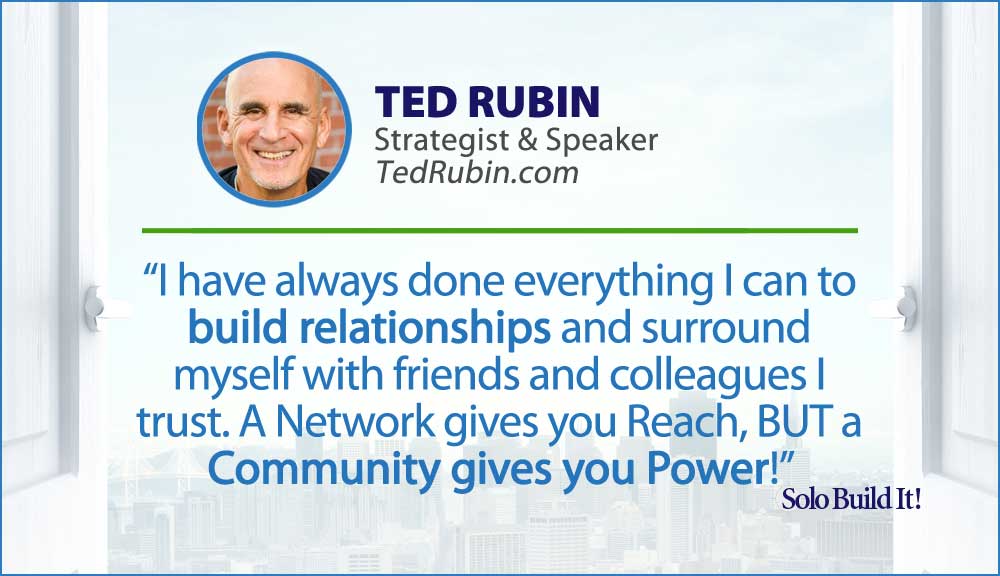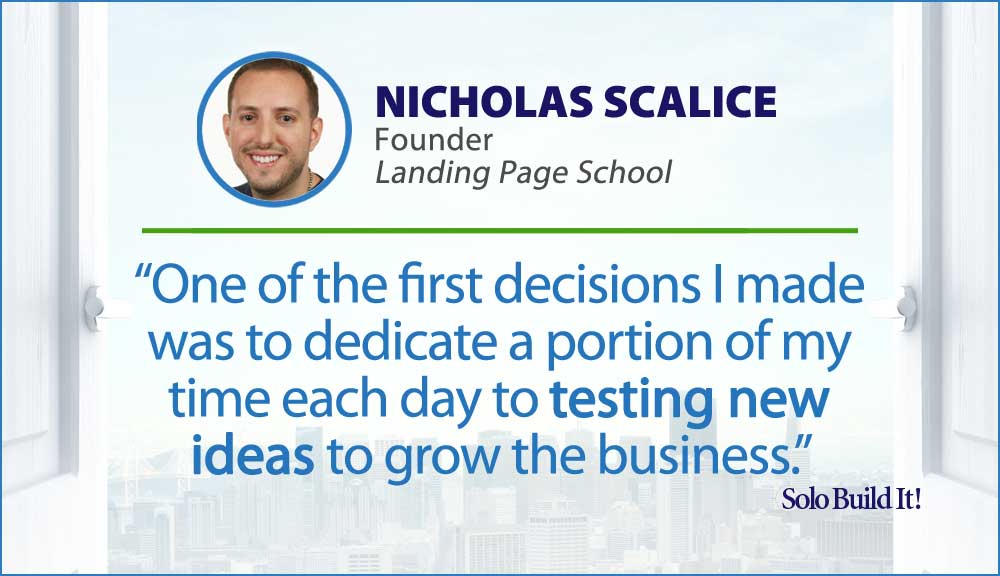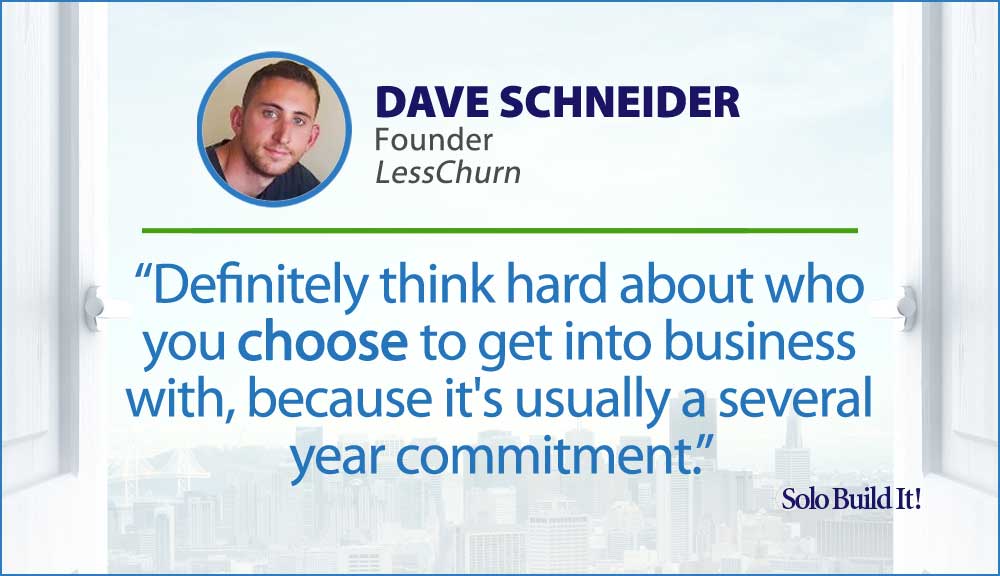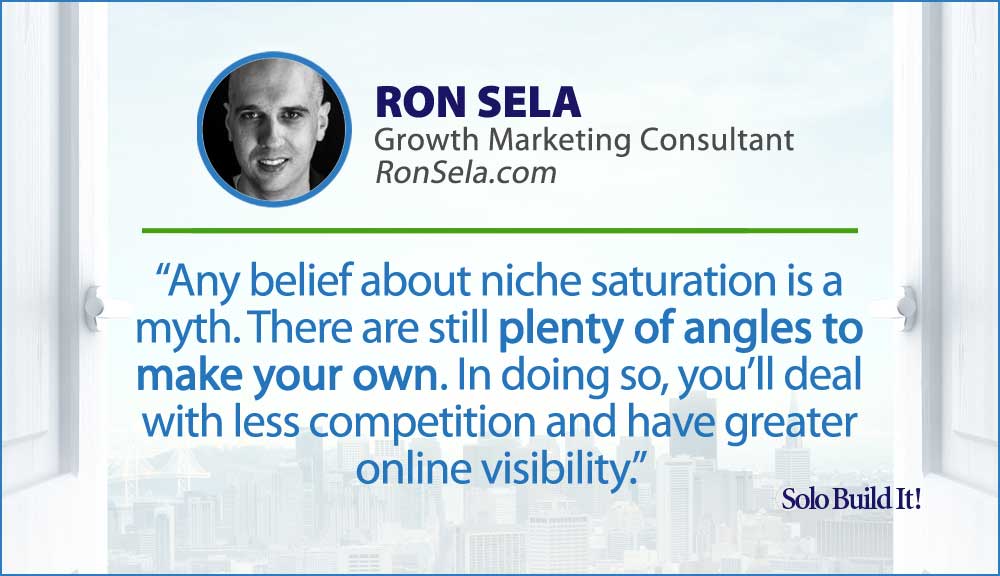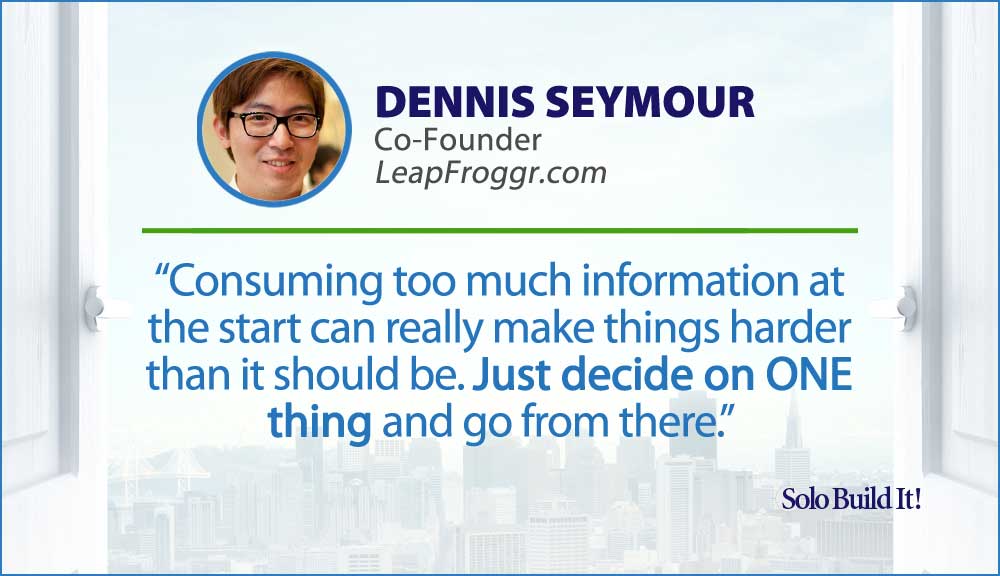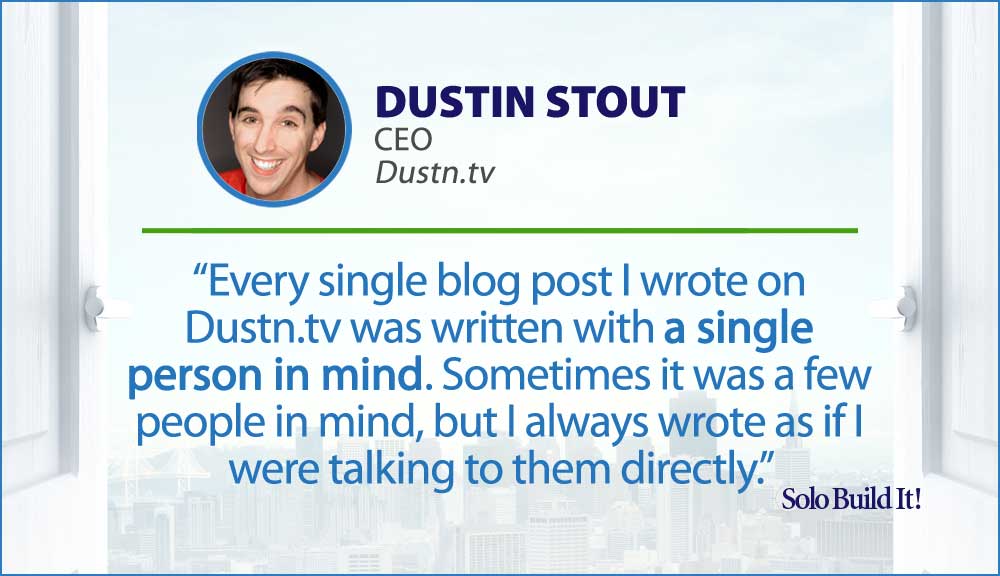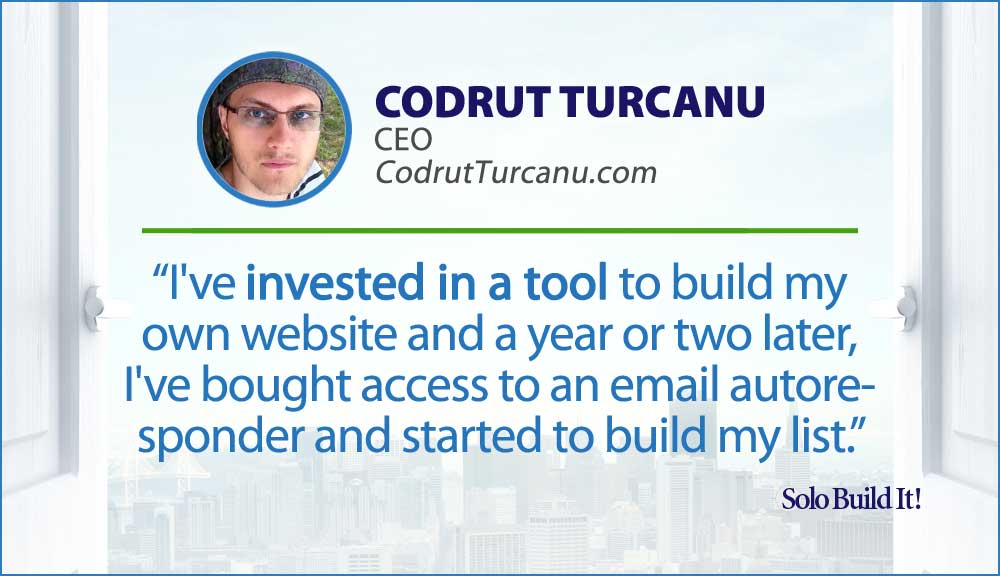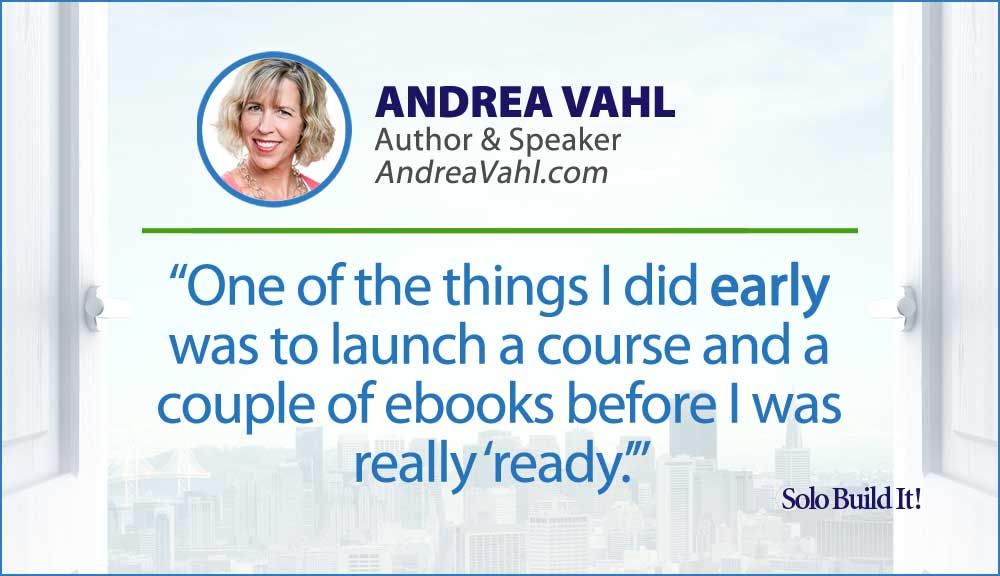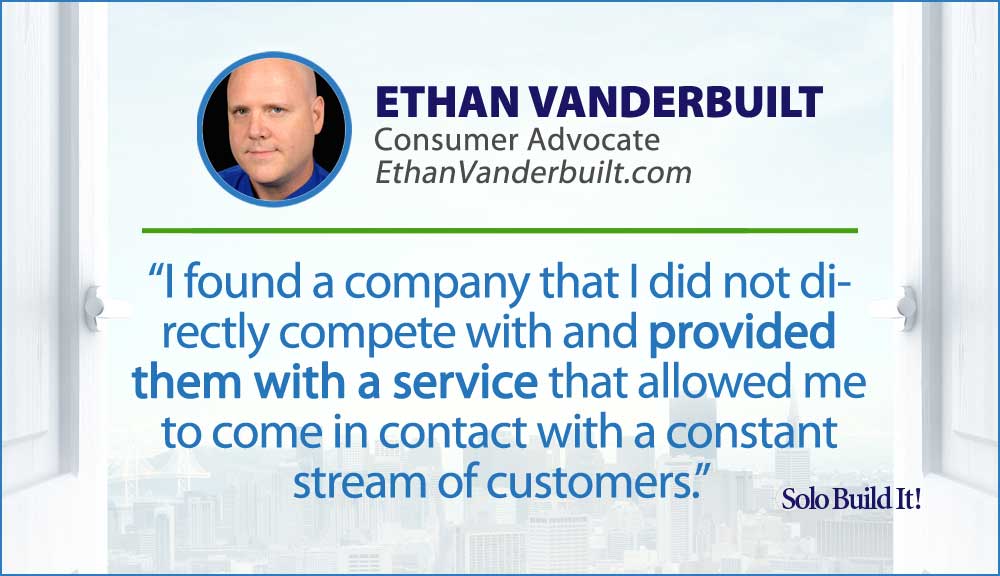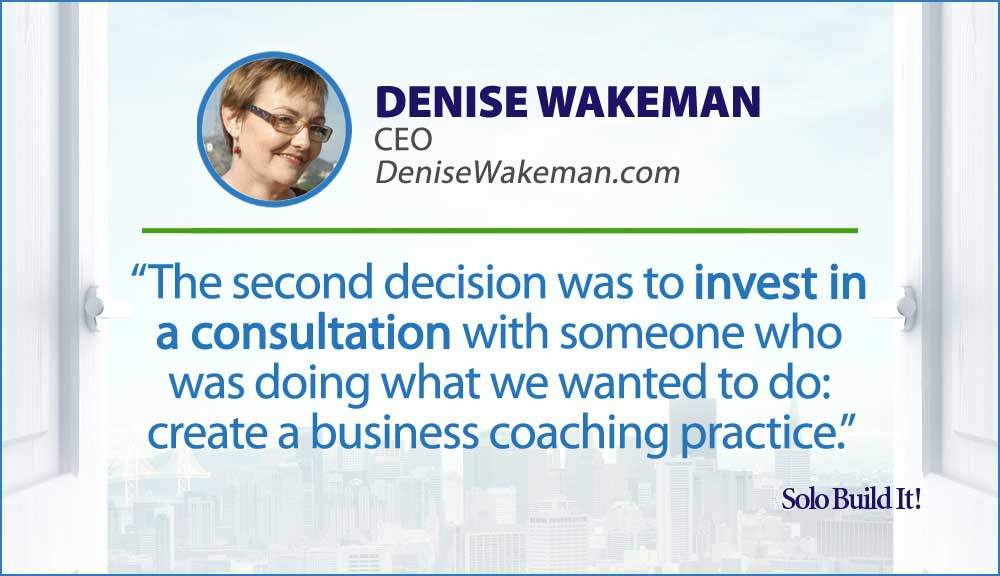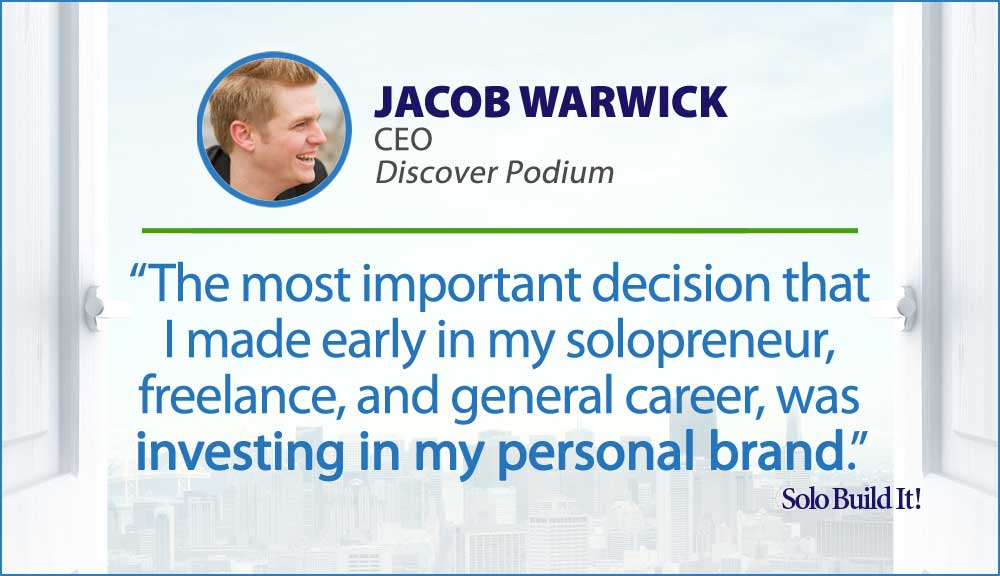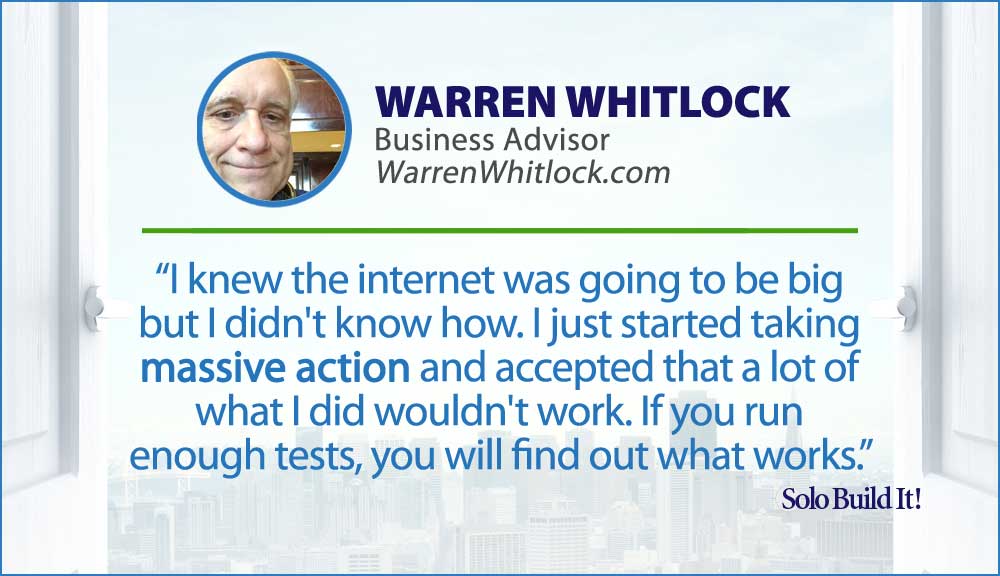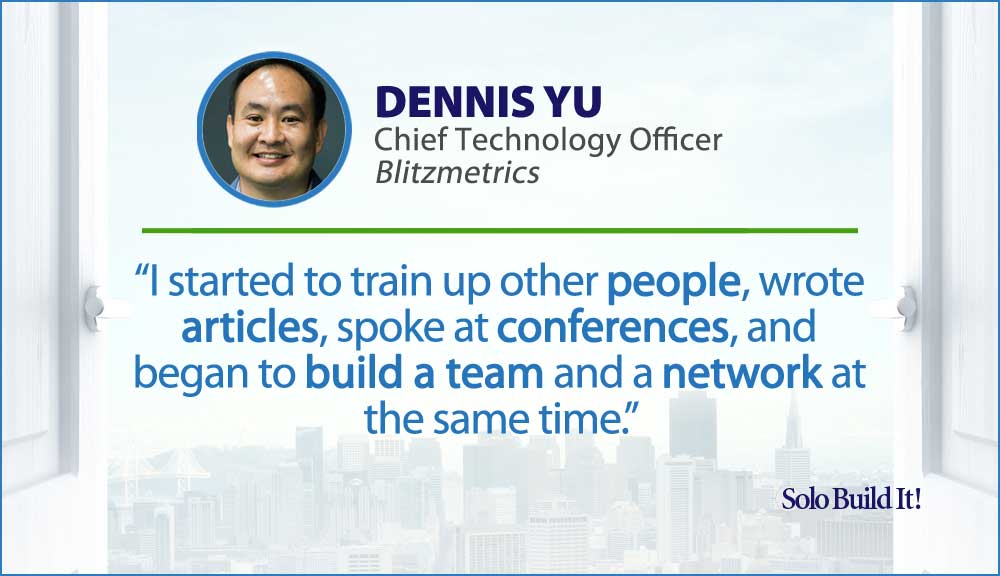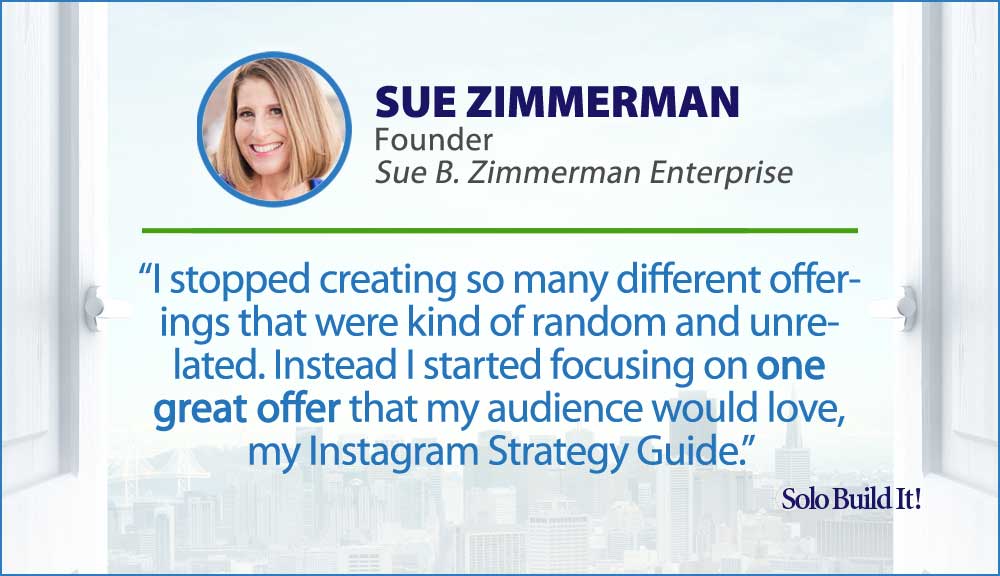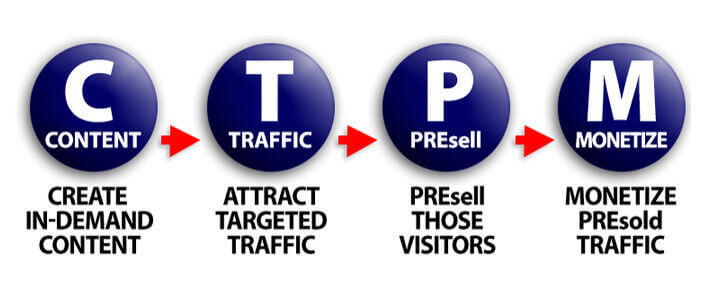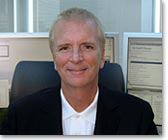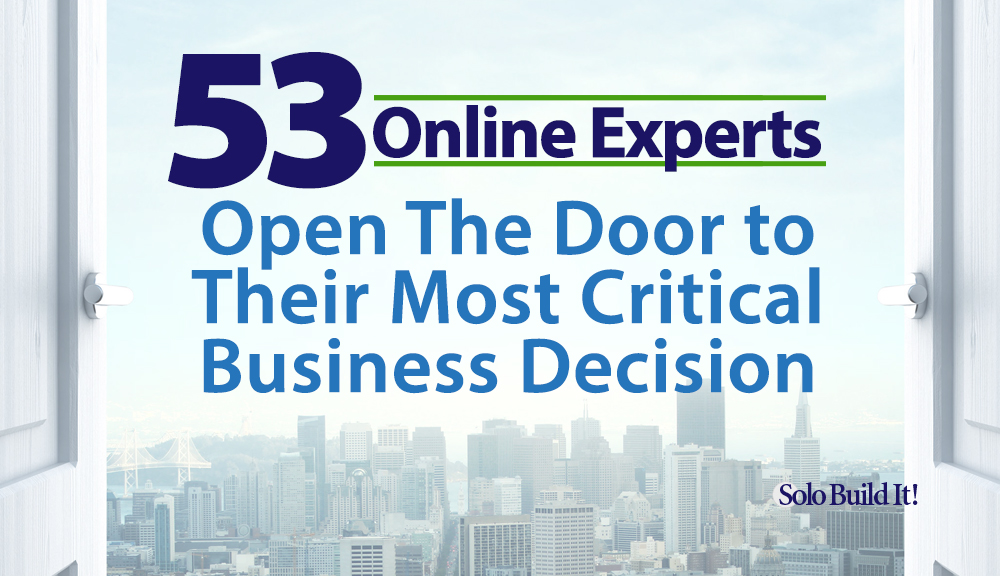
Don’t base your decisions on the advice of those who don’t have to deal with the results.Anonymous
Did you know that the average adult makes approximately 35,000 decisions every day? That’s a mind blowing number, even if most of them are small decisions (should I have Spaghetti Carbonara or Bolognaise for dinner?).
No matter how insignificant, the sheer number of decisions wears you out until you get to a point of decision fatigue.
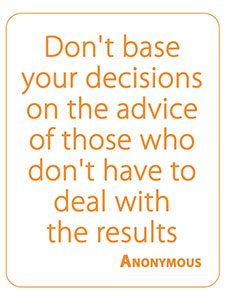 Making bad decisions seems unavoidable. How could you get 35K decisions right each day? And while a bad dinner choice may only result in an upset stomach, the wrong decision in your business career could prove much more serious.
Making bad decisions seems unavoidable. How could you get 35K decisions right each day? And while a bad dinner choice may only result in an upset stomach, the wrong decision in your business career could prove much more serious.
Even more so when you’re a solopreneur (the focus of this roundup). As a “solo entrepreneur” you don’t have a large team to consult about decisions. It’s pretty much up to you to get it right. Working from home, you don’t have colleagues to ask.
So, where do you turn for advice? There’s no shortage of experts for any conceivable part of business-building. But whom can you trust? As a rule of thumb, insist on proof of results.
When a niche marketing expert tells you s/he has helped hundreds of clients build 6-figure businesses, ask him/her for a list of clients with real names and domains.
When web hosts or website builders claim to have thousands of “successful” customers, ask for case studies, or a results page with sites built by their customers, ideally lots of them, and in a variety of niches.
Through a series of recent studies we realized just how important the early decisions are for your success as a solopreneur. When you start “on the wrong foot,” it takes you much longer to see results.
The takeaway from these head-to-head comparisons was clear: the platform you choose for building your online business plays a much bigger role for achieving success than you may think. We’ll talk more about this in our summary.
First though, let’s turn to our 53 experts who contributed to this roundup. These are people who’ve already “made it” in their various fields of expertise. They’re the kind of people you want to learn from when you’re just starting out, or when you haven’t yet reached the success you were hoping for.
We asked them a single question:
Thinking back to the beginning of your online business / solopreneur career, which early decisions did you make and how did they impact your business success?
Read on for 53 answers packed with real-life insights, or skip down to the summary.
It is in your moments of decision that your destiny is shaped.Tony Robbins
John Paul Aguiar
Blogging Entrepreneur, Money Dummy Blog
When I first started online I didn’t have a lot of free money to spend on the learning I needed about blogging, social media, SEO, branding and email marketing.
I literally downloaded every free ebook or course from trusted bloggers that I could find.
That learning was enough to get me up and running and seeing success pretty quickly.
Besides that, in the beginning I put a heavy attention on connecting and building relationships with the bloggers and marketers that I looked up to. I would comment on their blogs, I would share their content on social media, I would sign up to be an affiliate of their products.
That work I put in to really build relationships has been a big reason for my success online. Many of those relationships still continue today, over 10 years later.
Now a few things I did offline to help grow my business was to learn how to work from home and be successful doing it.
For one, I treated my day as if I would go to work somewhere, I would shower and dress up. This got my mind in a work mode that kept me focused and productive.
Also I kept my tv off till 4pm each day. This was a big help to keep me from getting distracted.
Working from home is a beautiful thing, but you need to learn to keep yourself focused. You need to learn how to self motivate, since there is no one there telling you what to do and not to do… it’s all on you.
About John Paul
Entrepreneur Blogger helping you grow your blog and small business using social media and online marketing.
Mike Allton
Author, The Social Media Hat
While there have been many decisions throughout my career, and many times when I felt that I made a right (or wrong) decision that resulted in a significant change in direction, one of the most prominent was in 2013.
6 months prior, I had started a new website and online business, The Social Media Hat. I’d created the site as a place to publish content about social media & blogging, without a firm idea of how I was going to monetize it.
I just knew I wanted to be able to write about the topics I was most passionate about. So I did that. I wrote and wrote and wrote, published lots of content, and shared that content to all my social channels.
And it wasn’t working.
I’d get some interest and engagement, but nothing substantive. It was on Google+ that I started to meet some new people, and those people were kind enough to point out that I wasn’t being social on social media. I was essentially just spamming the network. Yes, I was sharing good, interesting content, but I was doing nothing more than broadcasting it.
They were eye-opening conversations, to say the least.
I immediately changed how I used that network, and others. I started being more deliberate about who I connected with and the conversations that I had. I began to take the time to really craft social shares instead of just hit the button and move on.
Soon, instead of a trickle of new followers per day, I was getting hundreds. I went from 3000 to 185,000 followers within a matter of months, and my website traffic, revenue and brand awareness rose right along with it.
That decision to use social media for relationship-building instead of broadcasting had, and continues to have, a massive impact on my personal and business success.
About Mike
Mike Allton is a Content Marketing Practitioner, award-winning Blogger and Author in St. Louis, and the Brand Evangelist at AgoraPulse. Mike teaches a holistic approach to content marketing that leverages blog content, social media and SEO to drive traffic, generate leads, and convert those leads into sales.
David Amerland
Author & Speaker, DavidAmerland.com
Very early on I faced the problem of how do you stand out in branding yourself? The web is filled with personalities and it is filled with brands. Everyone tries to shock in order to capture attention. There is always a fad or some gimmick or some new approach to try.
While marketing is important I also personally dislike the kind of marketing that tries to emotionally and psychologically manipulate the audience into believing something. It never lasts long in its impact and it does a disservice to the marketing industry.
In my deliberations on how to best move forward, entirely by chance and when doing something unrelated, I came across Oscar Wilde’s quote: “Be yourself; everyone else is already taken.”
It’s a simple as it is profound.
It made me think, deep down, about who I really was and what I really wanted to do. In articulating some of my deepest held values and principles I suddenly realized that what I had to do to brand myself was simply find ways to be as real as I possibly could.
It’s harder than it sounds. At the same time it has allowed what I do to help develop who I am and vice versa.
About David
David Amerland is an Author, Speaker and Analyst. He is passionate about technology, social equality, web trends and social media.
Jessica Ann
Founder and Creative Director, Jessica Ann Media
I took huge financial risks. I spent hundreds of thousands of dollars investing in private mentorship programs and paying for flights and hotels to meet people in-person at industry events.
Some of these expenses worked out and others did not but I have absolutely no regrets. Everything got me to where I am today (and I’m happy to report that my business is now in the black!).
About Jessica
Jessica Ann is a keynote speaker, best-selling author, and podcast host.
Jonathan Aufray
Co-Founder and CEO, Growth Hackers
At the beginning of Growth Hackers, I decided to focus on one marketing channel at the time and on one type of clients only. For success, focus is crucial and only businesses that do that can succeed.
So, to promote our company, we worked on one channel until we mastered it and then, we started to work on another channel. We also just wanted to work with startups at the beginning.
So, our messaging, brand voice and target were just startups. These made things easier to sign new clients. Once we were more comfortable and became bigger, we broadened our target audience.
About Jonathan
I help startups, small to medium-size companies and fellow entrepreneurs grow. I help them drive traffic, generate leads, improve conversions and increase revenue with inbound marketing and growth hacking.
Kelly Baader
Founder, Christian CEO University
Willing to choose smaller group of clients I truly want to serve, and not worry too much about the number game.
It paid off big time in many ways: revenue, impact, sustainability.
About Kelly
Kelly helps Christian entrepreneurs focus on sales mindset to accelerate profitable growth.
Ryan Biddulph
Blogger, Blogging From Paradise
The two biggest decisions I made were to cut the strings and to buy my domain and hosting.
Cutting the strings meant not seeking employment after I had been let go from my prior job. I gave 100% of my attention and energy to being a solopreneur, meaning I faced, embraced and released many deep fears which helped me become the guy I am today, aka, I was outside of my comfort zone regularly.
Buying my domain and hosting ensured I owned my online real estate and brand. Big difference maker for a pro blogger. I started my blog on a rock solid foundation by going the self-hosted route.
About Ryan
Ryan Biddulph is seen at @virgin @forbes @foxnews @entrepreneur and @huffingtonpost. He has written 126 eBooks, and retires to a life of island-hopping at Blogging From Paradise.
Michael Brenner
I made an early decision to focus on a few core service offerings and despite some tempting requests to veer off course, stayed focused on those offerings.
The temptation to take on work that may ultimately becomes a distraction was much more difficult to resist than I thought. But it has paid off in the end.
About Michael
Michael Brenner is a globally recognized keynote speaker, author of The Content Formula, and CEO. He teaches leaders to focus on the work that matters to them, their team, and the world.
Rich Brooks
President, Flyte New Media
To be a teacher. People are always seeking out information, advice, how-to’s, and more. They want to run their business better. They want to be healthier. They want to have better relationships with friends and family. They want to be more secure in their finances.
Whatever they need, and whatever you offer that matches up with that need, requires guidance.
We often forget how much we’ve already learned about our business or industry. The trick to attract the right type of client or customer is to help them become more informed to make better decisions.
About Rich
Rich Brooks is founder and president of flyte new media, a digital agency in Portland, Maine. He is a nationally recognized speaker on entrepreneurship, digital marketing, and social media. He founded The Agents of Change, an annual conference and weekly podcast that focuses on search, social and mobile marketing. Rich is the author of The Lead Machine: The Small Business Guide to Digital Marketing, a popular and well-received book that helps entrepreneurs and marketers reach more of their ideal customers online.
Jeff Bullas
Founder, Jeff Bullas
I had just started in the technology industry. It was an exciting career change. Teaching had been left behind and I was now working for one of the first companies selling the IBM personal computer.
The management arranged to have all the sales staff complete a goal setting course. I can still remember the name of the company behind the course “SMI International”. The founder (Paul J. Meyer) was one of the revolutionaries of the personal development industry.
During this program I was inspired to write down my goals. A few months later I left to take a more senior sales position with another company.
One year later one of my top goals of earning a six figure income was realised. The power of goal setting had been manifested. It meant making some hard decisions to make sure that I gave myself the best chance of making them happen.
That goal setting ritual is a key life habit. Write down your idea or inspiration before it slips away.
About Jeff
Jeff is an entrepreneur, blogger, author, marketer and keynote speaker. He works with businesses to optimize their digital brand with emerging technologies, content, social media and digital marketing. His mission: “Inspire and educate people to win at business and life in a digital world.” He has spent most of his career involved with information technologies, telecommunications and the web.
Lilach Bullock
Content Marketer and Social Media Specialist, Lilach Bullock
One of the biggest decisions I took when I first started out with my online business was to focus on building my social media presence. It might not seem like much today, but back then (over a decade ago), most businesses didn’t really see the value in social media marketing.
In fact, it felt like most businesses and even marketers thought it was just a fad and would not last. Clearly, as we all now know, that wasn’t the case.
Looking back, I am so happy I fell in love with Twitter when it first came out and used it heavily to promote my business. I can safely say it’s been one of the most important factors in my business success and continues to be to this day.
About Lilach
Lilach Bullock is highly regarded on the world speaker circuit, and has graced Forbes and Number 10 Downing Street. She’s a hugely connected and highly influential entrepreneur. One of Forbes’ top 20 women social media power influencers, she was also crowned the Social Influencer of Europe by Oracle. She is listed as the number one Influencer in the UK by Career Experts and is a recipient of a Global Women Champions Award for her outstanding contribution and leadership in business.
Evan Carmichael
Entrepreneur, Evan Carmichael
The most important business decision I made was to model success. To realize that I didn’t need to come up with all the answers myself.
When I asked myself ‘Who has already solved this problem?’ I researched Bill Gates’ story since he had the largest software company and I was running a software business.
I applied his strategies and it was the turning point for my company. Model success!
About Evan
Evan Carmichael is a believer in entrepreneurs. His book is One Word.
Ian Cleary
CEO, OutreachPlus
I made a decision to take content marketing seriously and produce high quality content through my blog.
The investment in the blog is hard because there is very little return in the short term but it has been instrumental in any success I achieved.
Selling is important but it’s also important to build a pipeline for future sales.
About Ian
Founder of RazorSocial (inbound marketing) and OutreachPlus (outbound marketing). Ian is a regular contributor to Forbes and Entreprenuer.com as well as a keynote speaker at the top marketing conferences around the world.
Heidi Cohen
Chief Content Officer, Actionable Marketing Guide
As solopreneur, I was fortunate to have a mother who became an entrepreneur after leaving her conventional job as a social worker for a Not-For-Profit agency. She was a gerontologist and started her own consulting business targeting large corporations to help them take care of their aging parents.
In terms of my own career, I was fortunate to learn online technology while at Citibank where I was part of a team that created a global content intranet in 9 months. (That was a big deal in a bank in 1997!)
Further, I headed marketing for the digital division of The Economist between 2000 and 2001. In addition to renting our email list, my department generated revenues with a variety of online subscriptions.
Like many other marketers, I had to reinvent myself after the dotcom crash in late 2001.
As I built my business, I taught marketing at NYU where I had to develop my entire courses and later became a columnist at ClickZ where I wrote the Actionable Analysis column. These two jobs helped cement my standing as a digital marketing expert.
I believe that life and career are rarely based on one specific decision. Rather it’s the accumulation of events that lead you to a set of opportunities.
About Heidi
Heidi Cohen is an Actionable Marketer, speaker, professor and journalist who shares practical advice on social media, content marketing, small business and life.
Andy Crestodina
Co-Founder, Orbit Media
I really didn’t know what I was doing. I just kept writing and publishing. It wasn’t until I figured out how to use Analytics properly before I started to see real growth.
Of course, I knew that some articles did well and others did not. That was obvious just by looking at traffic. But once I learned to look more closely at the data, I discovered at lot more.
Some content was doing well in some ways, but not in other ways. Eventually, I was able to break down the articles and results into different categories.
Traffic Champs
These posts were magnets for visitors. They’re easy to spot.
Potential Champs
By looking at the rankings and search data, I found that some posts had strong potential to be traffic champs, but were not there yet. They just needed more depth and relevance.
Falling Stars
These articles were the champs that were starting to drop in the rankings, often because newer, better content had been published and was pushing my content down.
Better Mousetraps
These were the posts that inspire action and get visitors to subscribe, but they weren’t getting much traffic. They needed more promotion and visibility. Sometimes just linking to these from a Traffic Champ made a difference.
Once this mini-framework for content audits was in place, I knew what to promote and how. I got more efficient and effective. In some cases, I stopped writing new articles and went back and updated older articles instead.
Here’s a little chart that will guide you on what to do with which of your articles. I hope it helps you as much as it’s helped me!
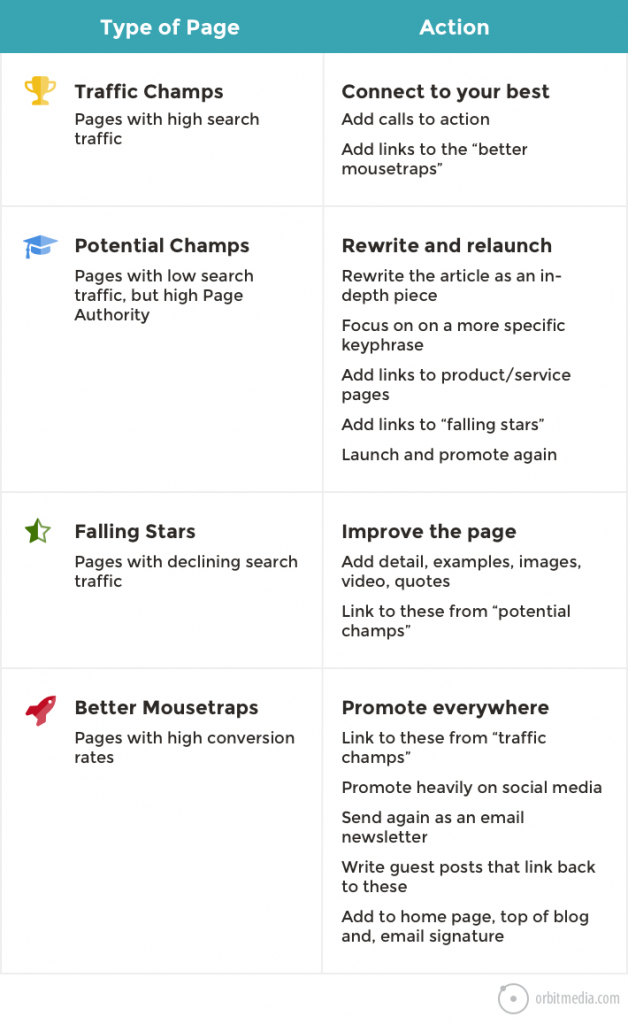
About Andy
Andy Crestodina is the Co-founder of Orbit Media, content marketer, speaker and author of Content Chemistry.
Minuca Elena
Expert Roundup Creator, Minuca Elena
When I started working online, like many other newbies, I started cold pitching to other online marketers. As you can imagine, that was a waste of time and effort.
After seeing no results, and losing the connection with some valuable people, I decided to stop pitching and focus on building my brand and over delivering to my clients.
It’s better to promote yourself and your services, in a way that attracts potential clients to you than to chase people that aren’t interested in what you have to offer.
Also, by over delivering to your clients you can get a one time buyer to become a regular customer. Build relationships with influencers and grow your reputation on the market. This will help you tremendously in your work.
About Minuca
Minuca Elena is a freelance writer who specializes in creating expert roundups. Her posts provide quality content, bring huge traffic and get backlinks. She also helps bloggers connect with influencers.
Ken Evoy
CEO & Founder, SiteSell
Most people today probably don’t remember that SiteSell used to publish books. There was no Solo Build It!.
I had retired back around 1995, or thought I had, but became interested in the commercial potential of the Internet. After a month of exploring, I realized that I was consuming niche content, which meant that there would be great opportunities for those who created it.
My first book, Make Your Site SELL! (MYSS!), launched in 1997, was based on an experimental business that turned out to be quite successful. I had made copious notes of what worked, and what didn’t.
To make a long story short, we sold 1,000 copies of a niche-investing software at $1,000 each, in only 18 months. We limited sales to 1,000 copies because if we sold too many, the niche would have too much competition in it.
I had taught myself to write the software, how to write to communicate (as well as how to write sales copy) and how to rank high at the Search Engines. I thought it would take me 2-3 years to sell 1,000 copies – we “finished” in half that time.
Meanwhile, I was realizing that most people were giving advice and writing books without having the experience that I had accumulated. Nothing worked the way they explained it. Once you are on the “battlefield,” it’s pretty easy to see that most gurus had never got past the “theory stage.”
So I wrote the book. Make Your Site SELL! took me over a year to write. When authors talk about love-hate relationships with a book they are writing, I totally “get” that. 😉
But MYSS! did very well, selling over 150,000 digital copies and 15,000 “real world” books. After the second run (10,000 copies), I decided never to sell “molecules” again. A lot of books seemed to fall off the back of trucks. And folks would send the book back for refunds, saying they never read MYSS!. Problem is that they were heavily highlighted and dog-eared.
On top of that, it was just too much hassle to administer, such a bother compared to digital. With “e-products,” storage never gets empty, no one sends you back a book all messed up, expecting refunds, cost of production per unit is zero, etc. What could be better than making a sale and not reducing inventory by 1, right?
But that wasn’t the big decision. And today, there are companies that will take care of all the pain of selling “real” hard goods.
The really big decision I faced was how to suggest to readers how to deal with search engines. This was a time when search engine optimizers (SEO’ers) were writing about stuffing keywords. No one had yet reached the stage of doorway pages. So the widespread philosophy was to “beat” the engines.
However, I had also gone through the repeated trauma of the engines detecting a trick to get high rankings. It became obvious that it would become harder and harder to rank high. And that, sooner or later, most folks would not be able to beat the engines.
Even back then, I was using doorway pages before any of the SEO gurus wrote about them. Then, a couple of months after Excite (which had about 40-50% of the market back then) dropped my entire site. We had a contact, who (after much begging about what happened), explained that they detected what I was doing, and that a few others were doing the same.
Well, guess what? That’s when the SEO’ers started writing about doorways – yup, when a trick was starting to fail. So basically, you pretty much had to create your own winning ideas.
It’s also when I realized that the best advice would be to write for the humans, not the engines. I realized that if you OVERdelivered outstanding content that pleased the humans, the engines would become sharper and sharper at detecting that.
I don’t think there were many folks back then with that counsel, and it was spot-on. You still had to have keywords in all the right places on the page back then (“on-page factors”), but over time it was the “off-page/site” factors that grew in importance.
That stood us in good stead, too, for our follow-up product after the line of “Make Your ____ Sell!” branded books. That product was Solo Build It!. We moved to this combination of step-by-step instructions, tools, guidance and auto-updating after a survey about our books.
Every survey had indicated that readers loved them. But one survey told us that very few actually used them to build an online business. The only ones who did were folks who became the next generation of net marketing gurus.
But people were not doing what I had done — take something that you know and turn it into a product. Attract targeted traffic by winning the search engines. The big mistake I made was writing a typical book with chapters.
Meanwhile, my investing product had been a combination of step-by-step tutorials and a software tool. There are still people today who send me incredible letters, often with a gold coin inside, to thank me for selling it.
Why sell that product? For the same reason that I decided to stop selling books at SiteSell. It gives me no pleasure to make money if it’s not providing real value to someone.
So we created what is, today, Solo Build It!. It enables solopreneurs to build high-traffic sites at rates of 9X to 115X greater than other platforms such as Wix, WordPress, GoDaddy and Squarespace.
SBI! members (“SBIers) do exceedingly well at search, following that same basic advice… Please the human. The engines will follow.
There’s more to it than that, of course. As always, victory is in the details. But when we did the head-to-head, rigorous studies (which anyone can repeat if they don’t believe the results), even I was impressed by how much better SBIers did than any other group.
Search drives most of the traffic in our C T P M process. And it will continue to. It has evolved over the years, and will continue to do so, with the hot topic of the day being voice search.
Now we have the type of results that we wanted. SBIers do NOT create sites about making money online, net marketing, etc. Instead, they start with a niche they already know and love.
So they build “real” businesses based on real niches that grows substantial traffic which they monetize. They know to diversify their monetization because they have learned to do that before finalizing their niche selection, how broad or narrow it goes, its positioning, the voice of the writing, etc.
The foundation of the business is laid before writing the first page. But after that, delivering high-value content will continue to drive traffic, much of it mobile nowadays.
But no matter where the Internet goes next — people will still want to know something about something. And SBIers are there to help them out, all thanks to an old Search Engine. That is pretty “EXCITE”ing – sorry about that. 😉
That decision, made as I was writing my first book, continues to impact a totally different product that finally delivered on my dream for the books: Enable everyday people to grow successful online businesses.
I know that the concept of OVERdelvering in a niche you love is not new in 2018. But that’s not the real lesson. What is?
Often, you have to go against the grain. If you know your area, you can spot the way something should be, and not what common “wisdom” says it is.
When you get that right, it can benefit both your business and its clients for decades. And decades are centuries in “Net years.”
About Ken
Ken Evoy is the Founder, CEO, and Chairman of the Board of SiteSell Inc. He is the creator of Solo Build It!, SiteSell’s comprehensive Web business-building system and solopreneur incubator. Ken is also a successful inventor, author, and emergency physician. He feels strongly that solo entrepreneurs can be empowered by leveraging their income-building potential online.
Ashley Faulkes
Founder, Mad Lemmings
Looking back at the early days of my solopreneur life there were a few key things that made all the difference in eventually finding success.
1. Work out what sells, fast. Instead of guessing, and spending too much time on things no one wants, you have to be prepared to change, pivot, tweak on a constant basis.
Don’t become married to one service, offer, idea. Always look at what the market (your clients) are asking for and adapt. What you thought they wanted, or even what you are great at, is not always what you expect.
2. Network however you can. It’s not for everyone, I get that, but figuring out a way to get yourself out there and find people who can help you find clients has been the key for me. You never know where or when that luck will strike, so keep on expanding your network, whether it is online or offline.
3. Keep the end in mind. It is easy to plow onwards and forget what it is you are doing or aiming for. One piece of advice (I forget who gave it to me) is be careful what you aim/wish for in your business.
Because, eventually it might come true and then… is it really what you wanted?
Think about what you are trying to build in terms of time, money, work and life. And keep tweaking what you are doing to work towards those goals. It is about making a living, but it is far more than that at the end, and keeping that in mind in the longterm is crucial.
About Ashley
Ashley Faulkes is an SEO and WordPress pro who loves helping people get more customers via Google.
Gail Gardner
Small Business Marketing Specialist, GrowMap
One of the most important skills for being successful is being organized. No matter what you plan to do, setting up processes to keep track of your work is essential. Being able to stay on top of deadlines and a myriad of details, logins, and resources is a major factor in whether you thrive or fail.
Personally, I use the free version of Trello to do strategy and keep track of what I need to do. For collaborative projects, we rely on the Enterprise version of Wrike.
Whatever you choose to use, build relationships with both people who might become clients and with those others might consider competitors. Turn them into collaborators and refer work to each other. Recommendations are the most important method for growing your business.
About Gail
Gail provides marketing and social media strategies to small businesses and freelancers. Founder of GrowMap, you can reach her on Skype (username growmap), Twitter, and LinkedIn.
Kim Garst
CEO, KimGarst.com
One of the early decisions I made in my first business was to hoard the money I earned instead of investing it back into the business and into my own growth.
This was a huge mistake and one that I see so many making today. I was worried that the next dollar wouldn’t come so I hoarded the revenue I earned “in case.”
What I have found over the years is that a business grows as much as its leader. Investing in your business and your education is an absolute must for true sustainable business growth!
About Kim
Kim Garst helps entrepreneurs grow their business with social media. Keynote speaker, Forbes Top 10 Social Media Influencer. Live Video Pro. Loves God, family and hockey!
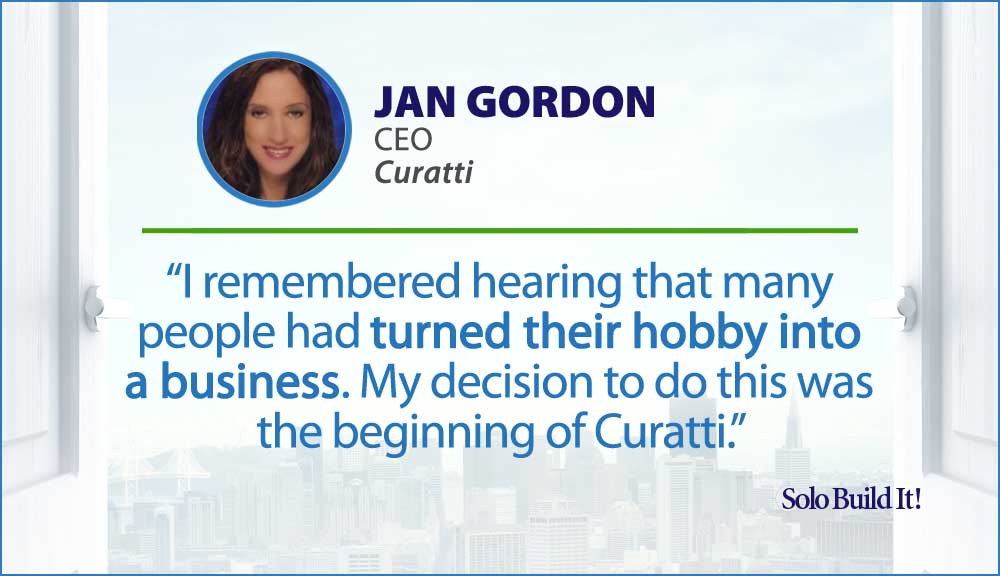
Jan Gordon
CEO, Curatti
I have always followed trends in media and technology that impact our everyday lives. It was a passion that led me to be read everything I could get my hands on about this.
I was on Twitter in the very early days and began sharing articles on different aspects of digital transformation. I began to meet people of like minds and built a following. I wasn’t selling anything, just contributing to others sharing my passion.
I began curating these articles on scoop.it and my following grew.
It was then that I remembered hearing that many people had turned their hobby into a business.
My decision to do this was the beginning of Curatti. Suddenly people who were once just my followers became my writers. Relationships I had built on Facebook became my clients.
The second decision I made was to be myself on all the social networks. I love technology, art, fashion and taking my own pictures. These four interests were demonstrated on Instagram, Facebook, and Pinterest.
Doing this gave people points of commonality that were the basis of some wonderful relationships. I have made lifelong friends and have gotten clients as a result.
About Jan
Jan Gordon is a Top 20 Global Social Media Influencer 2018, Founder and CEO of Curatti, people connector, lover of beauty, traveller.
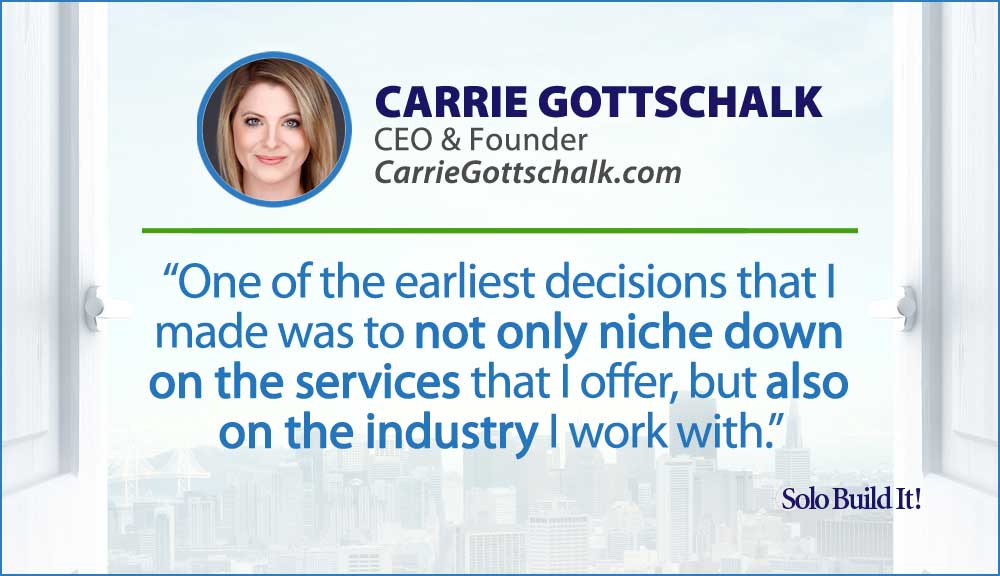
Carrie Gottschalk
CEO & Founder, CarrieGottschalk
One of the earliest decisions that I made was to not only niche down on the services that I offer, but also on the industry I work with. I decided to only focus on digital advertising (not full social media / content and community) as a service.
The reason for this was that it was a lot easier to show ROI in conversion numbers vs adding up all of the little metrics for content and community management. The second decision was to focus on health and wellness.
As I worked with more outdoor and apparel companies, I was able to learn quicker and duplicated my results across clients without always having to change my thought process.
This also lead to a lot of referral business and within the first year of being self-employed I easily hit my max client limit and was invoicing over $10,000 per month.
About Carrie
Carrie is a highly recognized influencer within the social media industry and has been at the forefront of the social media revolution for 10 years, paid social media for 5 years, and has managed over 10 million dollars in ad-spend — working with large clients Shari’s Berries, Wyndham Hotels, and Freida Rothman.
With her extensive experience in domestic and international markets she’s known as a skilled social media strategist, advertiser and has also gained a strong understanding of digital performance metrics with a good portion of her experience in eCommerce, Direct Response, and Performance Marketing.
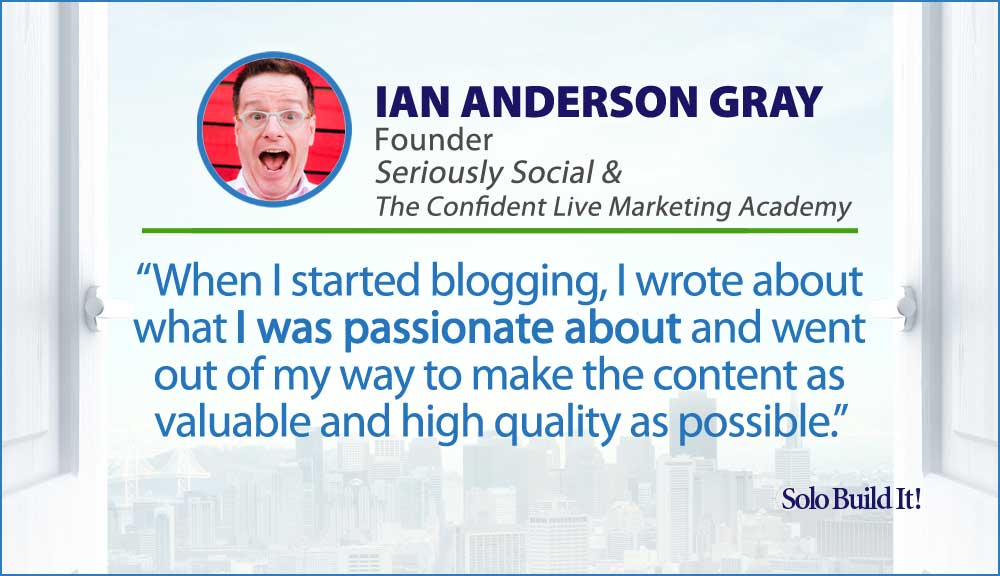
Ian Anderson Gray
Founder, Seriously Social & The Confident Live Marketing Academy
When I started my online business I made many poor decisions. I was naïve and unfocussed.
And to be honest, I didn’t even realize I was creating an online business. But that was part of the reason for my success.
When I started blogging, I wrote about what I was passionate about and went out of my way to make the content as valuable and high quality as possible. Because of that, a few of my early articles started to get a lot of traction and my audience grew.
Since then, I’ve had to become more focussed and organised, and I’ve put into place a monetization strategy. But without that early passion and hard work, I doubt I’d have an audience or a business to promote.
About Ian
Ian is a Confident Live Marketing consultant and founder of Seriously Social. He’s an international speaker, trainer, teacher, web developer and consultant. He has a passion for making the techno-babble of live video and social media marketing easy to understand.
Follow @iagdotme
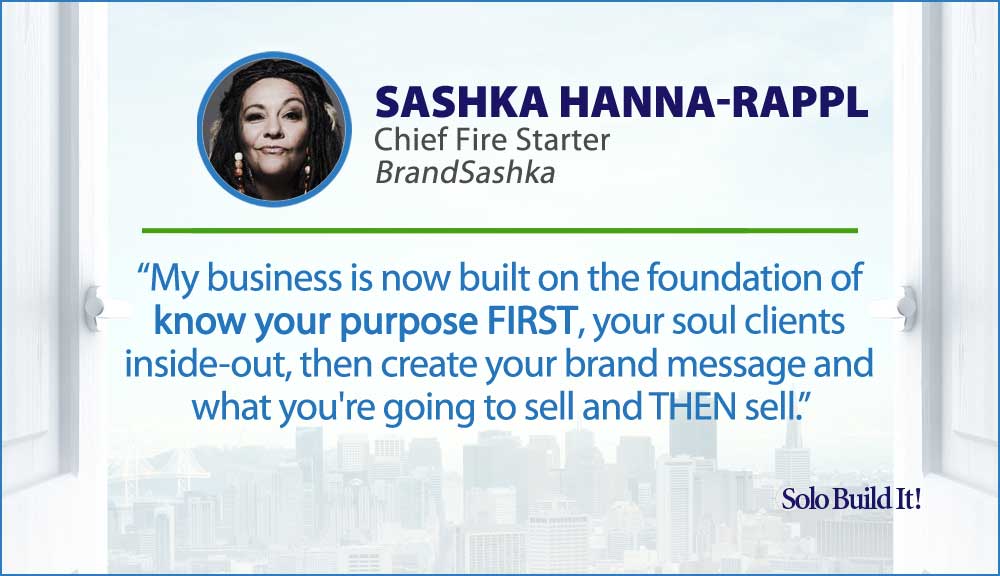
Sashka Hanna-Rappl
Chief Fire Starter, BrandSashka
As a Visionary and Creative I have ideas – many many many ideas – always. At the beginning of my business I just tried to sell the ideas as a whole, rather than create a long-term strategy built around that idea.
By just selling bursts of ideas I wasn’t congruent or consistent with my brand. I was spread all over the place. Making it difficult for my soul clients to understand, let alone comprehend what it was that I did for a living.
The implications of not communicating clearly and with focus and purpose lost me clients – which is why my business is now built on the foundation of know your purpose FIRST, your soul clients inside-out, then create your brand message and what you’re going to sell and THEN sell.
And to ALWAYS remember that DONE is better than perfect. Do it now and perfect it tomorrow but always keep the purpose in sight to keep consistency and congruence with the brand.
About Sashka
Sashka Hanna-Rappl is a leadership coach, branding-marketing strategist, entertainer, author and speaker, serving visionary underdog leaders in the lifestyle market, who want to go from no name to brand leadership without selling their soul but leading with it. Her signature approach is to Brand Your Soul® using Soul Brand Marketing®. Her methods are creative, wise, humorous and imaginative, to help lifestyle entrepreneurs ‘come-out-of-the-closet’ with a brand that is tailored to the entrepreneur rather than the product and/or service.
Sashka is the author of Soul’d Out: Your Guide to Finding Your Life Purpose, which also includes a 50-page workbook, written for people who want to find their life purpose and apply it to their vocation. Trained as an actress, dancer, singer, consumer behaviourist, marketer and advertiser, she’s empowered hundreds of clients, students, children and event attendees, to see that their life purpose is what steers their brand and gives it soul and the brand leadership entrepreneurs desire.
Tim Hughes
Co-Founder & CEO, Digital Leadership Associates
We got Digital Leadership Associates (DLA) onto social as fast as we could and ramped up our content marketing as a priority.
As a social business we do no outbound, no cold calling, no advertising, no cold emails and no in-mails.
In the last 20 months we have posted over 400 blog articles and from that we get 3 piece of inbound, everyday. This earned media, coupled with the global nature of social media has enabled us to get global customers quickly, as well as scale fast.
About Tim
Tim Hughes is the Co-Founder of Digital Leadership Associates, a world-leading team of social media practitioners who can help you achieve business goals through social media. Tim is also the author of the best selling book “Social Selling — Techniques to Influence Buyers and Changemakers,” available on Amazon.
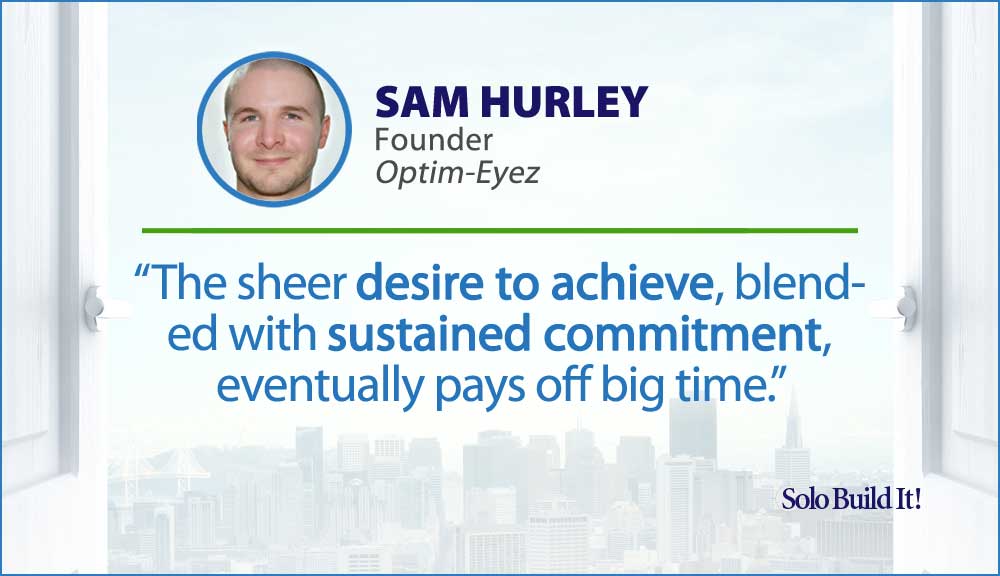
Sam Hurley
Founder, Optim-Eyez
Here are the 3 biggest fundamental decisions that positively impacted my solopreneur journey (in the earliest stages):
1. Relentless Dedication
Practice makes permanent. Spend enough time learning, building relationships and experimenting, and you will become what you once dreamed. The sheer desire to achieve, blended with sustained commitment, eventually pays off big time. You can never exercise enough reading, research and listening.
I wanted to get somewhere, and I didn’t stop. I turned my business into an obsession. Every solopreneur needs grit to carry on through tough times, too. (Which there ALWAYS will be.)
The decision to give 150% day in, day out, and sacrifice a lot of other things in life, ensured good things happened in business — despite the many challenges.
Anybody starting out needs to make this decision before anything else.
Are you prepared to run the gauntlet?
2. Cutting Back & Saying ‘NO’
Building a personal brand was the best decision I ever made. However, it is a hell of a lot to cope with behind the scenes!
At one point, I was gaining 100+ million monthly impressions on Twitter, ~25K link clicks, thousands of monthly views on LinkedIn, plus hundreds of direct messages on Social Media (per day!!).
Then tons of emails, accounting complexities, trying to build a website, blog roundups, interviews etc etc.
Aside from that, replying to and helping EVERYBODY who asked me.
Then, there was the actual business to run — and the small matter of earning revenue!!!
Buzz and brand growth of course, feels great… But there came a time when it began to really affect my health. I literally couldn’t leave the computer because the build-up was immense.
This was when I knew it was time to begin making changes.
I made the decision to cut everything in half.
Social Media posts, interaction time, blog roundups, email checking. Cut by 50%+, and I finally started saying ‘no’ to requests. Then, I chopped all that by another 50%, and another %, and another…
Today, my health is better and I can enjoy life much more, too — while all my early efforts have continued to flourish the business.
3. Daring To Be Different
If you’re the same as everybody else, or acting a certain way to try to be somebody you’re not, things just won’t work. Build your OWN brand, and your own path.
Importantly, this doesn’t mean ‘be a jerk’. Some choose this method in hope of standing out, but it’s a very short-sighted approach. (You only attract jerks, too).
Focus on bringing true value to others, in your own unique way.
You’ll know when you get it right, because 1) You’ll begin receiving negative attention from people who WON’T dare to be different, and 2) You’ll see a HUGELY supportive tribe forming before your eyes, waiting eagerly for your next piece of content or business update.
Break the mold! (And grow a thick skin.) It was a key component of my strategy.
About Sam
Sam Hurley is a lateral-thinking, people-focused digital marketer — holding solid experience in both agency and client-side settings. He now runs his own global personal branding and influencer marketing business: OPTIM-EYEZ. Catch Sam on Twitter and LinkedIn for cosmic amounts of helpful material on entrepreneurship and marketing!
Shep Hyken
Chief Amazement Officer, Hyken
If you build it, they will not come. The job isn’t to put up a website, hang a sign or create a product. The real job is to sell it.
I had a mentor, Bud Dietrich, that shared with me some very sage advice. He told me that much of what is done in a small business can be done in the evening and on weekend – writing, creative work, etc.
Week days, between 9 – 5 is for selling. That means picking up the phone or doing any other activity, such as networking, that connects you with a customer. And, if the phone is not ringing with the customer calling in, you have to go after the customer.
Bud said, “Spend 40 hours a week selling and you’ll get customers.” That turned out to be some of the best advice I ever received.
About Shep
Shep Hyken, customer service and experience expert, award-winning keynote speaker and New York Times bestselling author, helps companies deliver AMAZING customer service experiences!
Janet Johnson
CEO & Social Media Strategist, JanetEJohnson.com
Back when I started, I offered all internet marketing services. Everything from building websites, to email marketing services to managing Google ads to managing all social media sites. It was too much for me to learn and too many offerings for clients.
Over the years, I found it is best to niche. I moved my business into a social media specialties of marketing for 3 social media sites – Facebook, Instagram and Pinterest. I have referral partners for other online marketing areas.
This has helped customers to really understand where I can be of help to them, which converts to more sales and less overwhelm for me as a solopreneur.
About Janet
Janet E Johnson has more than 19 years of experience and millions of dollars earned for clients and her own business using online marketing strategies. Her career started on the internet selling on eBay in 1998. Her agency, www.JanetEJohnson.com, specializes in the areas of strategy and content, Facebook, Instagram, Pinterest and video marketing and advertising. She also hosts a popular marketing podcast, Business Growth Time.
Mike Kawula
CEO & Co-Founder, Dinner Table MBA
20 years plus in business both online and offline, and all I can say is it’s one wicked interesting ride.
I find that entrepreneurship is one constant daily lesson after another.
For each business I start I’ve taken lessons from my previous businesses to make my new startup a bit easier and over time that has worked.
Recently I’m back at it starting another new business called Dinner Table MBA where we want to get families back to the Dinner Table to have conversations more frequently about life. We serve parents the winning ingredients to empower their children to win at life.
Looking back to 2008, when I started one of my first online businesses, I focused almost entirely on pay-per-click marketing and nothing on content marketing or organic traffic.
Our company skyrocketed and we became the 144th fastest growing company here in the U.S. but each year, each month, each day, we had to start over in essence paying Google for traffic.
It wasn’t until 2011 that we started to focus on SEO and creating content.
Since then it’s always been a strategy of our companies’ growth and traffic, because it’s the gift that keeps on giving when done the right way.
As we’re building Dinner Table MBA now, though we’re doing paid traffic, content is a very big focus and it’s already paying off in a short amount of time.
My best advice is having patience and creating systems.
Are entire team utilizes Trello (free) and we each have certain responsibilities for each piece of content that comes out. The system assures we don’t forget anything.
This is a basic overview of our system:
1. Keyword / Competitive Research
2. Write / Create the content
3. Repurpose the content
4. Outreach
5. Review via Google Search Console to optimize and adjust based on performance
Doing this assures we stay organized and that nothing is skipped. We do this for our Blogs and our 2 different Podcasts for the business. This creates massive content everywhere that over time is continually sending us traffic and long-term reward our business.
Be patient and don’t ignore Content Marketing.
Good Luck.
About Mike
Mike Kawula is the Co-Founder of Dinner Table MBA. Michael is an entrepreneur whose last 3 businesses each hit 7 figures in under 3 years with his past being ranked the 144th fastest growing company by Inc. Magazine in 2012.
He’s an author, has been featured on CNN, interviewed by Anthony Robbins and featured in over 100 publications over the last few years. Michael has been an entrepreneur since 9/10/2001, has a strong passion for marketing, startups, his family and the Florida beaches.
Aaron Lee
Founder, AskAaronLee.com
Here’s what I learned from my early decisions starting my business.
1. Value is important
Starting a blog was important. I was sharing my thoughts and tips for everyone to learn. Tweeting amplified my thoughts on the blog.
Sure people could do it themselves on what they learned from my blog, many in fact did. That wasn’t the people I was going after. I knew there were people who would rather hire me to save time to focus on more important things. My gut was right. They in fact did.
Just tweeting people wasn’t going to cut it, I had to show for it.
2. Social proof
I wasn’t just another Twitter or marketing blog. I had social proof. I showed how it helped ME.
My Twitter presence was the social proof. I had the presence; what I taught on my blog was what I learned on how to grow a presence. The fact that I was from a place that no one had probably heard off was a blessing in disguise.
There’s probably more but these two are the most important pillars of what made my entire career today.
About Aaron
Aaron Lee is the regional manager APAC at AgoraPulse and the founder of AskAaronLee.com. Trying to perfect the art of cappuccino. Introvert with awesome hair.
Molly Marshall
Social Media Strategist, MollyMarshallMarketing.com
I had been working in digital marketing for over a decade, and I knew a lot about a lot of different online disciplines, but one of the best decisions I made early on was to put my stake in the ground and focus on just ONE niche within the digital marketing space.
I decided to teach mostly Instagram marketing, and it was absolutely crucial to positioning myself as an expert very quickly.
About Molly
Molly Marshall teaches entrepreneurs and small businesses how to systematically and simply grow an online presence that they can make money from. Through her award-winning blog, workshops and online courses, she’s known for her approachable, “let me show you how” advice that proves growing a small business through digital marketing is simple… all while never pretending that it’s easy.

Donna Merrill
Pro Blogger, DonnaMerrillTribe.com
When I first started working online I knew I had a core message that I wanted to communicate. I believed in that core message, and considered it my calling to help people by delivering it to them in ways that would improve their lives.
And I knew I would never compromise that core message or settle for anything less than total success in my mission.
I can happily say that over the years I have been able to do exactly that. Not because I’m so unusual or exceptional, but because I was determined to stay true to this calling.
I decided to be consistent and persistent in this endeavor.
So, I stuck to my core mission and never (seldom, anyway) deviated from it. That’s not an easy thing to do amidst all the glitz and glitter you find online. It’s easy to wander off into the lost lands of bright shiny objects.
But I made the decision early on to stay squarely focused on where I was heading. That meant that I had to divorce myself from the “results” of what I was doing.
I could not be looking over my shoulder to see how how many people were liking me on Facebook, or how many visitors I had to my latest blog post. I needed to stay focused on the process that I had developed for the delivery of my core message. If you are just starting out online, I would give you the same advice.
Develop a core message, a solid process for delivering it and then stay on track!
Do not deviate, endlessly checking your metrics and looking for better results. When you persistently and consistently work through your “process,” the results take care of themselves.
And stick to your belief in yourself. Never compromise your principles. And never settle for anything less than your total success.
About Donna
Coach and mentor, blogging and personal branding expert. Ask Me How YOU can build a strong personal brand and loyal following online.
Estelle Metayer
President and Co-founder, Competia
As a solo entrepreneur, you need to surround yourself with professionals to handle things like administration better, and free your time to focus on your customers and products.
I would also suggest that you take a cue from big business, and build an “advisory board” with people you trust and who will help you. It does not need to be formal – but the spirit of being surrounded by people who are more knowledgeable than you in certain areas, and who are willing to help with your venture is invaluable.
It’s also fun and motivating. Meet with your “advisory board” once every couple of months and give them an update on how things are going!
About Estelle
Estelle Metayer brings vast experience and fresh perspective to the ever-changing world of Competitive and Strategic Intelligence. A noted expert, her intuitive, precise research provides managers, CEOs, and board members with the right tools to effectively build and hone their competitive intelligence and strategic planning – to avoid blind spots, capitalize on strengths and excel.
Adel de Meyer
Co-Founder, Advisor, Author, Speaker, AdelDeMeyer.com
First of all, I started with my message and target audience. You have to know exactly what you want to achieve, the problem you solve and how you are going to communicate WHO you are to a global audience.
Then you need to establish a good brand identity in terms of your logo and brand colours. I would say having a good professional website and well branded Social Media profiles are a must in today’s digital space. I can truly attribute my website and branding to a big part of my success.
Secondly, I made sure to set up a good ‘toolbox’. This was and still is vital to my productivity and business success. Having the right tools from the start made everything so much easier to handle and stay on top of.
Rather pay that $20 per month for a tool subscription than struggling and wasting hours which cost you more in time.
Lastly, I cannot express enough how much business and partnership opportunities I received due to networking and being active on Twitter, Instagram and, to some extent, LinkedIn.
I decided from the start to approach business differently. In my first two years as a solopreneur, I didn’t have to do cold calling, send lead gen emails or stalk people on any kind of direct messaging (DM) to ask for business or to “sell myself.”
All my business came to me through Twitter, LinkedIn and Instagram. The key is I make time daily to engage with others, take part in Twitter chats, ask to collaborate on big and small projects with peers in your industry. I do guest blogging and podcast interviews, and I write on my own blogs and bigger publications.
About Adel
Adel de Meyer is a new media specialist, brand ambassador, author and mentor with focused expertise in using Twitter and Instagram for business. She has a top-listed digital marketing blog. Adel is recognised as a leading Instagram and Twitter influencer on social media and business in Australia.
Pam Moore
Co-Founder, Marketing Nutz and Social Profit Factor
One of the most important factors in my success as an entrepreneur and small business owner was the investment I made in relationships and learning from the start of my career and during my 15+ years in corporate America leading up to being an entrepreneur.
Although entrepreneurs can start “young,” many do not blossom until they have some solid business experience.
I knew I wanted to be an entrepreneur from the young age of 6 as I sold pet rocks, salamander lizards and anything from my mother’s pantry I could get my hands on. However, being raised by a single mom, I knew that if I wanted to succeed in this world, it would come from hard work.
At the age of 12 I started surrounding myself with mentors far more experienced and smarter than me. If it were not for these mentors who taught me about life, marketing, business, digital and even spent days “white boarding” the data center for me in enterprise hardware and software industry, I would not be where I am today.
It’s a huge reason I love paying it forward today and why we have focused our agency and social media / digital training academy, Social Profit Factor, 100% on helping people navigate the ever changing landscape of the online world.
It is the relationships that started over 20 years ago that helped my agency hit turbo from almost day one, that still provide us a constant stream of inbound leads.
Life is short. Look around and acknowledge those amazing people already placed in your life. They are gems and you can do much more amazing things WITH them than you can ever do all by yourself.
About Pam
Pam Moore aka “Pam Marketing Nut” is the CEO & Co-Founder of Marketing Nutz, an agile, social media and digital marketing training and consulting company that specializes in personal branding, conversion optimization and helping business leaders not just do social or be social, but be socially relevant. She also hosts the popular Social Zoom Factor podcast and is the co-founder of the Social Media Profit Factor training academy providing entrepreneurs to Fortune 100 brands information, tools and resources they need to zoom turbo in both life and business.
Dorien Morin-van Dam
Social Media Consultant, More In Media
I made a decision early on to ‘fake it until I make it’.
I started to teach social media classes and workshops locally as I was learning about social media myself. I was able to meet up with a lot of local business owners who needed help with social media this way and immediately several of them became my first clients.
Others remember my willingness to teach and still refer clients my way to this day. Nothing can replace a real handshake and looking into someone’s eyes; not even online networking can do that!
Jumping in before I ‘felt’ ready got me out into the community, resulted in new business and ultimately allowed me to be recognized as a leader in my field.
About Dorien
Dorien Morin-van Dam is a social media consultant, trainer and keynote speaker. She is a regularly featured expert on CBS where she shares social media strategies, live video tips and the marketing news for businesses. You’ll recognize Dorien online and on-stage by her signature orange glasses, a nod to her Dutch heritage.
Donna Moritz
Visual Storyteller & Digital Content Strategist, Socially Sorted
I was sitting at soccer one day with a friend of mine, Nikki Parkinson (from top Australian blog Styling You), watching our kids and she recommended that I start a blog.
I started Socially Sorted soon after. That single decision changed my business from being a small consultancy to being a award-winning blog-driven business that now earns money because of my blog itself – including brand partnerships, online programs, affiliate and speaking.
Starting to create core content from Day 1 was a pivotal point in setting up the business I have today. Whether it’s a blog, podcast or video, you should be creating consistent core content from Day 1. It’s a game changer!
About Donna
Donna helps business owners get more traffic, shares and sales using visual social media and content strategy.
Dan R Morris
My dad went into the military out of high school. When he turned 40, the year I graduated from high school myself, he retired.
And then, ten years ago, he and my mom started FrontPorchIdeas.com through Solo Build It! — and low and behold their singular focus on the site turned into a full time, six figure earning mammoth.
I on the other hand couldn’t decide what I wanted to do and divided my focus amongst a variety of projects that didn’t necessarily piggyback upon each other. This divided focus is an early decision that slowed my success for sure.
It takes twice as long to grow two businesses than it does one, because math doesn’t take into account momentum, and snowballing growth. I think BC Stack could be a million dollar project by now if I had devoted all my time and energy to making that one thing a success.
It’s clear now that we’ll get there. What’s not clear is where we would be had we had singular focus on the way up.
About Dan
Dan R Morris is the co-owner of BC Stack, Blogging Concentrated, Amplify Today Podcast and FindingJoy.net.
Charlie Patel
I come from a project management background, so task management and deadlines are ingrained into my work style. However, the key for me has always been to end every day with a COMPLETED to-do list.
I start each day with my ‘daily deliverables’ of 3 – 5 priority items, and a handful of other tasks that are either important, time-sensitive, or roadblocks. I do the hard tasks first and complete my daily deliverables every day.
When the week ends, I have 15 – 25 concrete, measurable, and relevant deliverables that demonstrate forward progress.
Rinse and repeat this daily and it’s amazing to see what type of results 8 hours of focused productivity can generate.
I now operate 7 successful businesses simultaneously.
About Charlie
Charlie Patel is a serial entrepreneur and digital marketer who is the CEO of various companies including Triberr, 99 Robots, Podcasts.com, and Ampfluence.
Ted Rubin
Strategist & Speaker, TedRubin.com
I learned very quickly to be careful about looking back too much. I made sure to learn from my mistakes, but tried not to second guess myself.
I have always done everything I can to build relationships and surround myself with friends and colleagues I trust… A Network gives you Reach, BUT a Community gives you Power!
Relationships are like muscle tissue, the more you engage them, the stronger and more valuable they become.
A great mentor drilled into me that some friends will be for when you just need someone to listen and offer comfort; some will be for when you need advice and support. And others will ALWAYS be there. Learn to differentiate.
Modeling myself after people I admired… not those I am jealous of.
I was always prepared to reinvent myself:
- Ask why aren’t you happy, why do I want to reinvent?
- What are you passionate about — can you make it a career?
- Once you make the decision to do it, go for it!
Learn to stop worrying about the perfect plan. Try things and get immediate feedback (which you can do easily these days through social media).
My biggest mistake: Giving up too soon and letting too much time go by before trying again.
About Ted
Ted Rubin is a leading Social Marketing Strategist, Keynote Speaker, CMO of Photofy, MC/HOST of Brand Innovators and their monthly Marketing Summits, and Co-Founder of Prevailing Path. Ted is the most followed CMO on Twitter according to Social Media Marketing Magazine; one of the most interesting CMOs on Twitter according to SayMedia, #13 on Forbes Top 50 Social Media Power Influencers, and number #2 on the Leadtail list of Top 25 People Most Mentioned by digital marketers.
Return on Relationship, ROR, #RonR, is the basis of his philosophy… It’s All About Relationships! His books, Return on Relationship, was released January 2013, How To Look People in the Eye Digitally was released January 2105 and The Age of Influence… Selling to the Digitally Connected Customer was released in May 2017. Ted is currently writing his latest book, along with business partner and Retail Thought Leader John Andrews titled Retail Relevancy.
Nicholas Scalice
Founder, Landing Page School
One of the first decisions I made was to dedicate a portion of my time each day to testing new ideas to grow the business.
Most of my time was spent on the core mission (delivering exceptional results for clients), but at least 10% of the day was spent discovering trending topics, testing new tools/tactics, and figuring out how to stay a step ahead of the competition.
About Nicholas
Nicholas Scalice is a growth marketing consultant who helps brands turn more website visitors into customers, through landing page design, A/B testing, and conversion optimization.
Dave Schneider
Founder, LessChurn
Probably the biggest decision I made with NinjaOutreach was choosing a partner, which in this case was Mark Samms.
The two of us worked well together and for that reason we were able to successfully grow and exit the company, when many startups fail because the business owners don’t see eye to eye – which is a real shame.
Definitely think hard about who you choose to get into business with, because it’s usually a several year commitment.
About Dave
Dave Schneider is the founder of LessChurn, churn reduction app. In 2012 he quit his job to travel the world, and has visited over 65 countries. In his spare time, he writes about SaaS and business at DaveSchneider.me.
Ron Sela
Growth Marketing Consultant, RonSela.com
You may have heard that just one out of every five new businesses survives longer than a year. In the early days, I made three key decisions that got me to where I am today.
Firstly, I chose a narrow niche of “growth marketing consulting for technology companies.”
While going niche is not breaking news, many new businesses still fall into the trap of being a jack of all trades. More often than not, they become a master of none. Going niche saves you from being pulled in multiple different directions, giving you added focus to keep things on track.
Any belief about niche saturation is a myth. There are still plenty of angles to make your own. In doing so, you’ll deal with less competition and have greater online visibility.
The second major decision was to focus my marketing efforts on just three channels – influencer marketing, search engine optimization, and social media ads.
Research from the University of London unveiled some of the negative effects of multitasking on brain-intensive tasks. Juggling too much can make you unproductive.
By putting concentrated efforts into fewer channels, you can be more productive with your time and will generate a better ROI.
The last key move I made was to focus on my customers. As a startup grows, it needs to be ready for customers’ changing expectations. I made it my mission to exceed expectations, turning my customers into advocates.
Taking a customer-centric approach can improve customer satisfaction and retention rates, generating valuable social proof, which ultimately, becomes a driver of future referrals and continuing success.
About Ron
Ron Sela is a growth marketer, who runs a boutique digital marketing agency that helps results-driven executives scale their user acquisition efforts.
Dennis Seymour
Co-founder, Leapfroggr.com
I decided to take action and actually stop planning things. It’s so easy to overthink things especially for new entrepreneurs.
You’ll keep thinking about how to do this or that, you’ll see a shiny new thing and you’d want to do that, too. You’ll see somebody doing something similar and you’ll want to do that as well.
It’s a cycle that will make you eventually give up without even trying. By actually realizing that, I took action and built on that over time. I would’ve never got to this point without actually realizing that.
Let me elaborate a bit on the above, to make it clearer what I mean with “take action and stop planning”:
When I was starting out, I was bombarded with a ton of things, from online marketing stuff (you know how big that is and top it off with gurus left and right) to building a site, to copywriting, to shiny new productivity tools, softwares, “hiring” a VA or not etc. etc.
For new solopreneurs, that’ll prove too much and can drive you away from actually getting started.
In my heart, I knew I wanted to be part of the online world, I guess that pushed me to move forward and made me realize that I needed to pick ONE path first.
I basically asked myself, what do I need to do first?
That led me to thinking that a website is a must, so I started with learning that.
Once I was satisfied, I then moved on to traffic generation. That’s where I learned about keywords, went back to fixing the site… and the rest was history. I added new skills along the way over the years.
Consuming too much information at the start can really make things harder than it should be. Just decide on ONE thing and go from there.
About Dennis
Dennis Seymour is a Full Stack SEO and Digital Marketer. Co-founder of Leapfroggr and SeriousMd.
Dustin W. Stout
CEO, Dustn.tv
Early on in my business, I made a very intentional decision to not be “all things to all people.”
I knew that in order to for my story to reach its full potential, I had to make sure it related to a very specific person. For me, it was more than a target audience, it was Karen. And Dale. And Catherine. And Bryan.
Every single blog post I wrote on Dustn.tv was written with a single person in mind. Sometimes it was a few people in mind, but I always wrote as if I were talking to them directly.
And that’s why people continue to tell me “I feel like you were talking directly to me when I read this.”
Doing this made it easy for real people to reach out to me because the message connected deeply. My content felt more personal to them, and that’s what compelled them to share and engage with it.
About Dustin
Entrepreneur, speaker , award-winning social media blogger. Co-founder of Warfare Plugins, makers of the best social sharing plugin for WordPress.
Codrut Turcanu
CEO, CodrutTurcanu.com
I made a smart yet scary decision back in 2002 when I took the Internet seriously about business building.
I’ve invested in a tool to build my own website and a year or two later, I’ve bought access to an email autoresponder and started to build my list.
That formed the core basis of my online business and catapulted me into my first $100k+ per year success, 2 years later.
About Codrut
Codrut Turcanu helps entrepreneurs connect with experts, influencers and probloggers.
Andrea Vahl
Author & Speaker, AndreaVahl.com
One of the things I did early was to sell digital products, launching a course and a couple of ebooks before I was really “ready.” What this did for me was to force me to learn how to do it, allow me to start monetizing my business early (although I think I only sold 5 seats in my first course) and then add to my authority in the field.
Then I could get better in the next iteration. I realized what worked and what didn’t.
A huge benefit was that when I got the offer to co-author the Facebook Marketing All-in-One for Dummies (along with Amy Porterfield and Phyllis Khare) the publisher liked that I had already written a couple of books.
About Andrea
Andrea Vahl is a Social Media Consultant, Speaker, and co-author of Facebook Marketing All-in-One for Dummies. She also likes to wear wigs.
Ethan Vanderbuilt
Consumer Advocate, EthanVanderbuilt.com
There were two key decisions that helped me gain long term success with my first business:
- When you no longer have someone to tell you how long to work or when to work, it can be a challenge finding a good work and life balance. I found that balance in the first year and it helped me with my long term success. Working 15 hours a day 7 days a week is not sustainable.
- One of the hardest things to develop early on is a constant flow of potential customers. I found a company that I did not directly compete with and provided them with a service that allowed me to come in contact with a constant stream of customers. This was the foundation of my long term success.
About Ethan
Ethan Vanderbuilt helps people avoid money making scams.
Denise Wakeman
CEO, DeniseWakeman.com
I started my first online business in late 1996. Three decisions impacted my success:
The first – selling everything, moving to a different country and having very little money – created a lot of stress at the outset and a lot of debt to family members.
While I wouldn’t recommend this path to anyone starting out today, it did motivate me and my husband to get our act together as fast as possible and hustle like crazy.
The second decision was to invest in a consultation with someone who was doing what we wanted to do: create a business coaching practice (this was at the dawn of the coaching industry).
We spent $100 to “pick his brain” about how to set up a coaching practice and how to create coaching programs. Rather than having to figure out how to start this kind of business, we got a kickstart with a model that enabled us to make offers right away.
Finally, the third decision was to have a website built. This was a fairly new concept in 1997 and it helped to quickly set us apart and to attract clients well beyond our local, rural community.
While the first couple of years were tough, we did build a 6-figure coaching business with both local and international clients within 6 years.
About Denise
Denise Wakeman’s motto is “Just say yes!” After a life-changing trek in the Andes, she embraced her inner Adventurer, and ditched the black business suits for a knapsack and hiking boots. As long as there’s wifi, Denise is a happy camper. She’s an early adopter and active experimenter and loves helping authors and online entrepreneurs navigate the journey of growing their business on the Web.
Jacob Warwick
CEO, Discover Podium
The most important decision that I made early in my solopreneur, freelance, and general career, was investing in my personal brand. To get started, I used my LinkedIn profile. You can use it as your “website” even if you don’t know how to code, purchase a domain, or anything else related to building a website.
Creating a consistent story for my professional experience accelerated my career and network far more than any other strategy that I have used; including paid advertising, general social media, mentorships, and thought leadership/content marketing.
Sure all of those elements are part of a successful personal brand—but those are simply tactics used to amplify your brand.
You have to make the decision to focus on and communicate your personal brand correctly, before getting bogged down in those extracurricular activities too heavily.
About Jacob
Jacob Warwick is the founder of Discover Podium and Think Warwick. B2B Tech and SaaS Executive. Forbes and Entrepreneur contributor.
Warren Whitlock
Business Advisor, WarrenWhitlock.com
My business success was never in question. I didn’t have a job. I didn’t leave a choice to accept failure. I never had a mentor to whine to and there were no experts to follow.
I knew the internet was going to be big but I didn’t know how. I just started taking massive action and accepted that a lot of what I did wouldn’t work. If you run enough tests, you will find out what works.
Now when I help people starting out, I try to listen kindly but I don’t hold back when someone questions whether it’s worth it. It is!
About Warren
Warren Whitlock is an influencer in health, business, tech, blockchain, solar and social media marketing.
Dennis Yu
Chief Technology Officer, Blitzmetrics
I worked 16 hours a day running Google AdWords, getting up only for bathroom breaks. And I made a lot of money, plus gained expert-level skills.
I left the house only to collect the checks that I earned from affiliate networks or to go to the grocery store to stock up on frozen dinners for the week.
But after doing this for 3 years all by myself, I was burnt out. I was lonely. I didn’t want to continue sitting in front of a screen of numbers all day making ads. So I started to train up other people, wrote articles, spoke at conferences, and began to build a team and a network at the same time.
I don’t regret being solo for the first few years of my career, since without that experience and knowledge, I’d not be able to coach other people.
About Dennis
Dennis Yu is the Chief Technology Officer of BlitzMetrics, a digital marketing company which partners with schools to train young adults.
He’s an internationally recognized lecturer in Facebook Marketing and has spoken in 17 countries, spanning 5 continents, including keynotes at L2E, Gultaggen, and Marketo Summit. Dennis has been featured in The Wall Street Journal, New York Times, LA Times, National Public Radio, TechCrunch, Fox News, CBS Evening News and is co-author of Facebook Nation – a textbook taught in over 700 colleges and universities.
Sue B Zimmerman
Founder, Sue B. Zimmerman Enterprise
I really struggled with balancing the feeling of constantly selling and promoting for the first year and a half of my business.
I can remember feeling like I would create something, start to promote it, and never feel like there was an end to the process. Like when was I supposed to stop? It was not a great feeling.
So I stopped creating so many different offerings that were kind of random and unrelated. Instead I started focusing on one great offer that my audience would love, my Instagram Strategy Guide. It’s 12 pages and comes with a worksheet to help hold people accountable and overcome initial stumbling blocks.
I now share the same guide on all my social platforms and track the performance using custom UTM links for each platform. (A UTM code is a simple code that you can attach to a custom URL in order to track a source, medium, and campaign name. This enables Google Analytics to tell you where searchers came from as well as what campaign directed them to you.)
I now know that Instagram is my #1 driver for growing my email list every week.
Instagram is my JAM and is where I spend the most time because it gives me the best results for growing an authentic community.
I believe that when you create great content that your ideal customer is craving, you have real conversations, with real people who get to know you and trust you and ultimately do business with you.
Instagram is the tool, the driver that helps my business grow by rapidly growing my email list everyday and now I teach others how to do the same.
About Sue
Sue B. is an insightful social media educator, energetic speaker, and in-demand business coach. Her blog is ranked as one of the top 10 social media blogs in 2017 by Social Media Examiner. She’s also one of the most popular CreativeLive instructors and has been named by Huffington Post – Top 50 Must-Follow Women Entrepreneurs in 2017.
Whether she’s taking the stage at an industry conference, like Digital Marketer’s Traffic & Conversion, or working one-on-one with her clients, Sue B. is driven to help business owners leverage the power of Instagram to meet (and exceed) their business goals. As a lifelong entrepreneur, Sue B. has over 30 years of business experience. With her extensive knowledge of social media, it’s Sue B.’s mission to teach, mentor, and empower others.
Summary: 4 Main Takeaways to Help You Make the Best Decisions in Your Solopreneur Career
Congrats! You made it all the way to the summary. Or did you “cheat” and skip right down here? I get it. You’re super busy. That’s why I’ve condensed the wisdom of our 53 contributors to just 4 main takeaways.
Nevertheless, I encourage you to bookmark this article and read through each answer as time permits. You never know which bit of individual advice might resonate most with you.
Takeaway #1: Focus and Go Niche
When you try to be everything to everyone, you accomplish being nothing to anyone.Bonnie Gillespie
Starting out as a solopreneur, you may feel tempted to “go wide.” Choose a broad niche like “social media marketing” instead of “instagram marketing,” “gardening” instead of “organic backyard gardening,” or “retirement” instead of “best places to retire.”
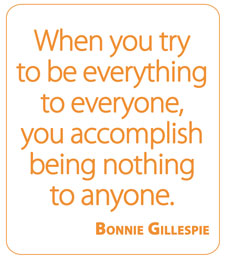 After all, the larger your potential audience, the bigger your chances of getting enough customers, right? In theory, yes. In reality? Not so much. There are several reasons why this doesn’t work.
After all, the larger your potential audience, the bigger your chances of getting enough customers, right? In theory, yes. In reality? Not so much. There are several reasons why this doesn’t work.
Firstly, there’s too much competition in a broad niche. You’ll never “win” social media marketing, gardening or retirement at the search engines.
Secondly, if you present yourself as an expert in too many areas, your “brand of one” won’t stand out from the sea of other experts. Your brand’s too vague. Your audience doesn’t get a clear and memorable impression of who you are and what exactly you can do for them.
Thirdly, you’ll spread yourself too thin if you try to go into too many directions. That doesn’t only apply to the broadness of your niche, of course. It also applies to the social media channels you choose to promote your business. It applies to products you make (or promote as an affiliate) and the types of services you offer.
It certainly applies to the question of whether you should start just one business or two.
If you listen to the wisdom of our “been there, done that” crowd of experts, you’ll know the answer to these questions…
Focus your efforts. Give your full attention to one business. Choose a narrow niche. Choose a smaller group of clients. Focus on building one great offering that your audience will love.
Takeaway #2: Create Outstanding Content That OVERdelivers
Content builds relationships. Relationships are built on trust. Trust drives revenue.Andrew Davis
Add just one more ingredient to Mr. Davis’ quote (“traffic”), and you’ll have the process that Solo Build It! members have used for nearly two decades to build their online businesses:
It all starts with your content. It has to deliver the answers your audience is looking for, in your unique voice. Your content (whether text, images, video or audio) is so amazing and well presented that complete strangers can’t help but develop trust and confidence in you.
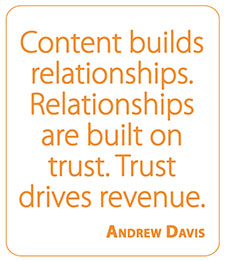 That’s where the relationship building (aka PREselling) sets in. Your content’s purpose is threefold. It gets you found at the search engines, it is being shared via social media, and it starts earning your readers’ trust. You then deepen that relationship by interacting with your visitors via your newsletter and on social.
That’s where the relationship building (aka PREselling) sets in. Your content’s purpose is threefold. It gets you found at the search engines, it is being shared via social media, and it starts earning your readers’ trust. You then deepen that relationship by interacting with your visitors via your newsletter and on social.
Once your readers like and trust you, the monetization (or revenue) part comes naturally.
Our roundup experts talk about the importance of content in various ways. Paraphrasing, these are the nuggets of advice we can pull from their experiences:
- Create consistent core content from Day 1. It’s a game changer.
- Overdeliver to attract potential clients rather than chasing them.
- Please the humans. The engines will follow.
- Ramp up content marketing and social presence.
- Make SEO and creating content your strategy for growth. It’s the gift that keeps on giving when done right.
- Offer value on your blog, based on personal experience.
- Write with passion. Go out of your way to make content as valuable as possible.
- Write with one person in mind. This will make your message connect deeply with the reader.
- Create great content that your ideal customer is craving.
To sum it up…
Outstanding, passionate content based on your personal experience is the engine that drives your business. It brings free, targeted traffic to your site and establishes you as a trustworthy authority in your niche.
Takeaway #3: Build Relationships and Network
In business it’s about people. It’s about relationships.Kathy Ireland
Building relationships and networking is the third core theme you’ll find throughout the answers from our 53 guest experts.
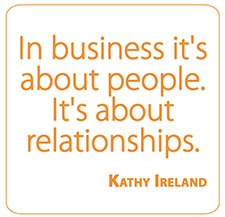 Pam Moore even started at the tender age of 12 to surround herself with mentors, people she considered as smarter and far more experienced than herself. 20 years later, these relationships were still alive and helped her kickstart her own business.
Pam Moore even started at the tender age of 12 to surround herself with mentors, people she considered as smarter and far more experienced than herself. 20 years later, these relationships were still alive and helped her kickstart her own business.
Take Pam’s example to heart. It’s never too early to start networking. There are so many ways to do this: in person, for example with colleagues and clients in your “day job,” at industry conferences and events, or even at local happenings in your community.
For the introverts among us, social media offers a welcome alternative to building relationships from the comfort of our home desk! 😊
Whatever method you choose, pour your heart and soul into it. Build real relationships, without an agenda. People sense whether you are genuinely interested in them, or just want to “use” them for your purpose.
Like with your personal friends, stay in touch when you don’t need something from them. Find ways to help and support them in their business or career. The community you’ll build this way is priceless.
To quote serial entrepreneur Gary Vaynerchuk: “Saying hello doesn’t have an ROI. It’s about building relationships.”
Takeaway #4: Launch Early – Done is Better Than Perfect
Have no fear of perfection – you’ll never reach it.Salvador Dali
Don’t those words of wisdom from an artist like Salvador Dali make you breathe a sigh of relief? It’s like he grants us the permission to be perfectly imperfect, in life and in business.
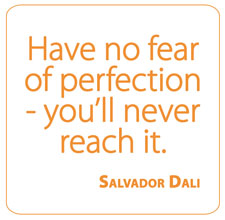 For your business, especially in its early days, it is vital that you don’t get caught up in “perfection paralysis,” as Solo Build It! member Elizabeth O’Brien calls it. She launched her first (and now most popular) online course before she had created all lessons.
For your business, especially in its early days, it is vital that you don’t get caught up in “perfection paralysis,” as Solo Build It! member Elizabeth O’Brien calls it. She launched her first (and now most popular) online course before she had created all lessons.
Having customers waiting for a new lesson each week held her accountable. She had to publish the lessons even if they didn’t quite live up to her own standard of perfection.
If you feel uncomfortable going fully public with a “not quite ready” product or service, you can always market it as a “beta” version. Invite your most loyal readers to become “beta testers” in exchange for early access at a reduced price. This way, you’ll get valuable feedback while you already earn from your product.
In addition, you’ll make your beta testers feel special and involved, turning them into advocates for your business.
There you have it. Four actionable key takeaways to get your business off to a great start:
- Focus and go niche.
- Create outstanding content that OVERdelivers.
- Build relationships and network.
- Launch early. Done is better than perfect.
The devil, though, is in the details. For example, how do you find out which niche is right for you, and whether it is too broad, or possibly too small to be profitable?
How exactly do you create outstanding content that pleases both humans and search engines? And which topics in your niche should you even write about?
You could do what Warren Whitlock, one of our experts, and a true online veteran did. When he first went online in 1981, he knew the internet was going to be big — but he didn’t know how. So he just started taking massive action and accepted that a lot of what he did wouldn’t work. He reasoned that if he ran enough tests, he would find out what works.
Today you can capitalize on the experience of pioneers like Warren. You still need to take action, for sure. But you can save yourself a lot of trial and error if you follow a proven process. When you have a time-tested process, step-by-step guidance and the tools to execute each step in your business-building journey, you are way ahead of the curve.
Remember what I mentioned at the beginning? That the “platform” (for lack of a better word) you choose for building your online business plays a much bigger role for achieving success than you may think?
We realized this when we compared traffic data from websites or blogs built with different platforms. We used traffic data because traffic is the closest indicator for a site’s success that is publicly available. In other words, anyone can do the same comparisons we did.
What we found was astounding. Based on samples of 10,000 sites from each platform, people using Solo Build It! to create their sites were between 9X and 115X more likely to generate high levels of traffic than with other popular site-building or blogging platforms.
Read more about the studies, their methodology and results here.
That’s what a successful platform looks like!
So — if you’re at the start of your business-building journey, do yourself a favor…
Choose the platform that gives you the highest chance of achieving results!
Latest posts by Margit Streifeneder (see all)
- From Traffic Peaks to Auto-Pilot: A Psychologist’s Website Success Story - March 27, 2025
- From Swim Teacher to Solopreneur: Building Passive Income Online - February 27, 2025
- From Concierge to Global Tours: 10 Lessons for Travel Business Growth - December 19, 2024

